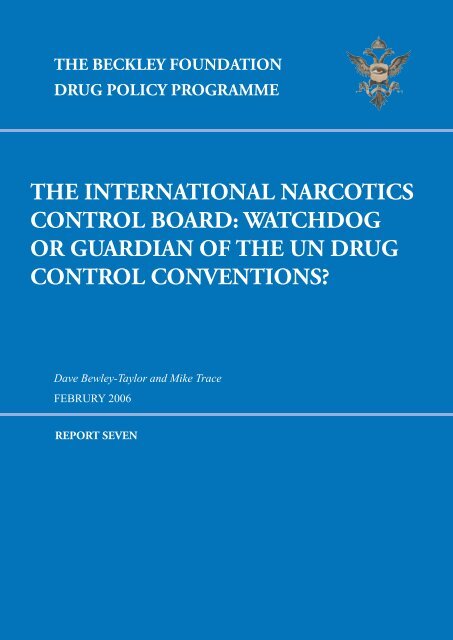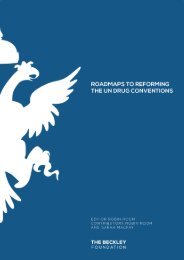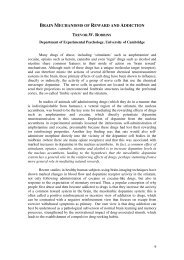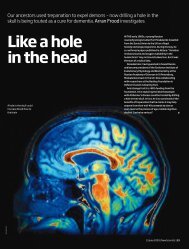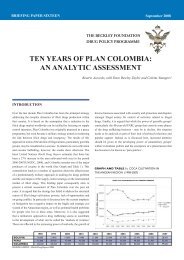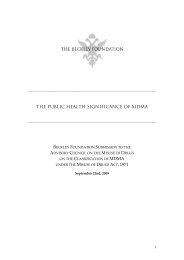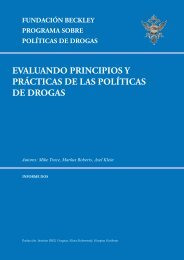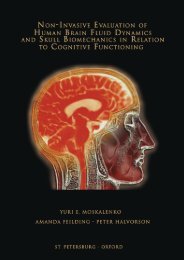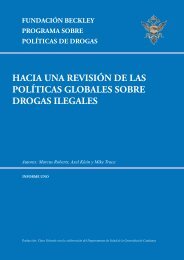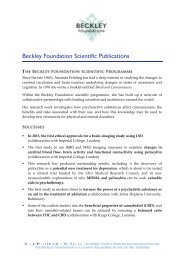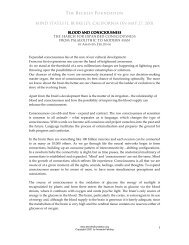Watchdog or Guardian of the UN Drug Control Conventions?
Watchdog or Guardian of the UN Drug Control Conventions?
Watchdog or Guardian of the UN Drug Control Conventions?
- No tags were found...
You also want an ePaper? Increase the reach of your titles
YUMPU automatically turns print PDFs into web optimized ePapers that Google loves.
THE BECKLEY FO<strong>UN</strong>DATIONDRUG POLICY PROGRAMMETHE INTERNATIONAL NARCOTICSCONTROL BOARD: WATCHDOGOR GUARDIAN OF THE <strong>UN</strong> DRUGCONTROL CONVENTIONS?Dave Bewley-Tayl<strong>or</strong> and Mike TraceFEBRURY 2006REPORT SEVEN
Rep<strong>or</strong>t 7THE INTERNATIONAL NARCOTICSCONTROL BOARD: <strong>Watchdog</strong> <strong>or</strong><strong>Guardian</strong> <strong>of</strong> <strong>the</strong> <strong>UN</strong> <strong>Drug</strong> <strong>Control</strong> <strong>Conventions</strong>?1Dave Bewley-Tayl<strong>or</strong> and Mike Trace. February 2006The Beckley Foundation <strong>Drug</strong> Policy Programme (BFDPP) is a new initiative dedicated to providing a rig<strong>or</strong>ous, independentreview <strong>of</strong> <strong>the</strong> effectiveness <strong>of</strong> national and international drug policies. The aim <strong>of</strong> this programme <strong>of</strong> research and analysis is toassemble and disseminate material that supp<strong>or</strong>ts <strong>the</strong> rational consideration <strong>of</strong> complex drug policy issues, and leads to a m<strong>or</strong>eeffective management <strong>of</strong> <strong>the</strong> widespread use <strong>of</strong> psychoactive substances in <strong>the</strong> future.SUMMARYThe current global system f<strong>or</strong> <strong>the</strong> control <strong>of</strong> illegal drugs such as heroin, cocaine and cannabis is enshrined in three United Nations (<strong>UN</strong>)<strong>Conventions</strong>, respectively dated 1961, 1971 and 1988. Established in <strong>the</strong> 1961 Single Convention on Narcotic <strong>Drug</strong>s, <strong>the</strong> International Narcotics<strong>Control</strong> Board (INCB <strong>or</strong> Board) is <strong>the</strong> body charged with monit<strong>or</strong>ing <strong>the</strong> implementation <strong>of</strong> <strong>the</strong> conventions, and <strong>of</strong> alerting member statesand <strong>the</strong> international community to weaknesses in <strong>the</strong> system, <strong>or</strong> its implementation. While <strong>the</strong> Board’s role in overseeing and quantifying<strong>the</strong> legal market in controlled drugs f<strong>or</strong> medical and scientific uses is widely admired, <strong>the</strong>re is growing discontent with <strong>the</strong> unbalanced nature<strong>of</strong> its contribution to <strong>the</strong> much m<strong>or</strong>e complex and sensitive debates surrounding <strong>the</strong> issue <strong>of</strong> illegal drug markets and how best to respond to<strong>the</strong>m. Consequently, critics have pointed out that <strong>the</strong> Board has moved away from its intended mandate as <strong>the</strong> ‘watchdog’ <strong>of</strong> <strong>the</strong> conventions- describing <strong>the</strong> global situation, and bringing attention to challenges and dilemmas - to become m<strong>or</strong>e <strong>of</strong> a ‘guardian’ <strong>of</strong> <strong>the</strong> purity <strong>of</strong> <strong>the</strong>conventions - challenging any policy <strong>or</strong> activity that does not c<strong>or</strong>respond with what it perceives as <strong>the</strong> <strong>or</strong>iginal vision <strong>of</strong> <strong>the</strong> control system. Byadopting such an uncompromising stance, <strong>the</strong> Board undermines its own auth<strong>or</strong>ity, and runs <strong>the</strong> risk <strong>of</strong> being seen as irrelevant to <strong>the</strong> shiftingchallenges faced by national governments and municipal auth<strong>or</strong>ities in responding to <strong>the</strong> widespread use <strong>of</strong> illegal drugs.THE INCB AND ITS PLACE WITHINTHE INTERNATIONAL DRUGCONTROL SYSTEMThe Vienna based INCB is, acc<strong>or</strong>ding to its own literature,<strong>the</strong> independent and quasi-judicial monit<strong>or</strong>ing body f<strong>or</strong> <strong>the</strong>implementation <strong>of</strong> <strong>the</strong> prohibition <strong>or</strong>iented United Nationsinternational drug control <strong>Conventions</strong>. These are <strong>the</strong> 1961 SingleConvention on Narcotic <strong>Drug</strong>s (as amended by <strong>the</strong> 1972 Protocolamending <strong>the</strong> Single Convention on Narcotic <strong>Drug</strong>s), <strong>the</strong> 1971Convention on Psychotropic Substances, and <strong>the</strong> 1988 Conventionon Illicit Traffic in Narcotic <strong>Drug</strong>s and Psychotropic Substances.Established in 1968 in acc<strong>or</strong>dance with <strong>the</strong> 1961 Single Conventionon Narcotic <strong>Drug</strong>s, 1 <strong>the</strong> Board is technically independent <strong>of</strong>Governments, as well as <strong>of</strong> <strong>the</strong> <strong>UN</strong>.MembershipIts thirteen members, principally pharmacologists, pharmacists,lawyers, police <strong>of</strong>ficers and medical doct<strong>or</strong>s serve in <strong>the</strong>ir personalcapacities. Acc<strong>or</strong>ding to Article nine <strong>of</strong> <strong>the</strong> Single Convention,<strong>the</strong>y should be persons “who by <strong>the</strong>ir competence, impartialityand disinterestedness, will command general confidence.” Themembers are elected in a secret ballot by <strong>the</strong> <strong>UN</strong>’s Economic andSocial Council (ECOSOC), serve f<strong>or</strong> a period <strong>of</strong> five years and canbe re-elected. When electing members ECOSOC must, with dueregard to <strong>the</strong> “principle <strong>of</strong> equitable geographic representation,” bemindful <strong>of</strong> including on <strong>the</strong> Board “persons possessing knowledge<strong>of</strong> <strong>the</strong> drug situation in <strong>the</strong> producing, manufacturing and consumingcountries.” Additionally, three members <strong>of</strong> <strong>the</strong> Board with medical,pharmacological <strong>or</strong> pharmaceutical experience must be taken from alist <strong>of</strong> persons nominated by <strong>the</strong> W<strong>or</strong>ld Health Organization (WHO).The Board elects f<strong>or</strong> one year terms its own President and o<strong>the</strong>r<strong>of</strong>ficers it considers necessary 2 , and meets in closed session twice ayear; <strong>or</strong> m<strong>or</strong>e if it is considered necessary.1 While this is <strong>the</strong> case, <strong>the</strong> INCB had predecess<strong>or</strong> bodies dating back to <strong>the</strong> League <strong>of</strong>Nations.2 F<strong>or</strong> example, First Vice-President, Second Vice President, Chairman <strong>of</strong> <strong>the</strong> StandingCommittee on Estimates and Rapp<strong>or</strong>ter.
2Current INCB MembershipName Brief Member Biographies Country MandateexpiringMarch 1Joseph Bediako ASARESevil ATASOYMadan MohanBHATNAGARElisaldo Luiz de ARAÚJOCARLINIB<strong>or</strong>n in 1942. Private Consultant and Psychiatrist. Medical Academy <strong>of</strong>Krakow, Poland (1965- 1971); postgraduate training at Graylands andSwanbourne Psychiatric Hospitals, Perth, Australia (1976-1977). Has heldmany seni<strong>or</strong> posts in <strong>the</strong> UK and Ghana, including Chief Psychiatrist,Ghana Health Service and specialist in charge at Accra PsychiatricHospital. Member <strong>of</strong> INCB since 2005.B<strong>or</strong>n in 1949. Direct<strong>or</strong> and Pr<strong>of</strong>ess<strong>or</strong> <strong>of</strong> F<strong>or</strong>ensic Science, institute<strong>of</strong> F<strong>or</strong>ensic Science, Istanbul University (since 1988); Pr<strong>of</strong>ess<strong>or</strong> <strong>of</strong>Biochemistry, Cerrahpasa School <strong>of</strong> Medicine, Istanbul University (since1988). Has held many positions and seni<strong>or</strong> posts in Europe and <strong>the</strong> USand been involved with EU and <strong>UN</strong> drug control activities. Member <strong>of</strong> <strong>the</strong>INCB since 2005.B<strong>or</strong>n in 1934. Bachel<strong>or</strong> <strong>of</strong> Law (1956) and Master <strong>of</strong> Arts in PoliticalScience (1955). Has held various seni<strong>or</strong> positions in narcotics controland administration in <strong>the</strong> Government <strong>of</strong> India and international lawenf<strong>or</strong>cement and drug control bodies. Member <strong>of</strong> <strong>the</strong> INCB since 2002.B<strong>or</strong>n in 1930. Full Pr<strong>of</strong>ess<strong>or</strong> <strong>of</strong> Psychopharmacology, Federal University<strong>of</strong> São Paolo (since 1978); Direct<strong>or</strong>, Brazilian Centre f<strong>or</strong> Inf<strong>or</strong>mation onPsychotropic <strong>Drug</strong>s (since 1988). Member <strong>of</strong> INCB since 2002.Ghana 2010Turkey 2010India 2007Brazil * 2007Tatyana B<strong>or</strong>isovnaDMITRIEVAB<strong>or</strong>n in 1951. Direct<strong>or</strong>, V. P. Serbsky State Research Centre f<strong>or</strong> Socialand F<strong>or</strong>ensic Psychiatry (since 1998). Chief Expert Psychiatrist, Ministry<strong>of</strong> Health and Social Development <strong>of</strong> <strong>the</strong> Russian Federation (2005).Pr<strong>of</strong>ess<strong>or</strong> <strong>of</strong> Medicine (since 1993). Has held many seni<strong>or</strong> positionswithin <strong>the</strong> Russian Federation, including Minister <strong>of</strong> Health (1996-1998).Member <strong>of</strong> <strong>the</strong> INCB since 2005.RussianFederation2010Philip O. EMAFOGilberto GERRAB<strong>or</strong>n in 1936. F<strong>or</strong>mer consultant to <strong>the</strong> Organization <strong>of</strong> African Unity,Addis Ababa, lecturer in Biochemistry, lecturer and Seni<strong>or</strong> Lecturer,Pharmaceutical Microbiology and Biochemistry, Chief Pharmacist andDirect<strong>or</strong>, Pharmaceutical Services, Federal Ministry <strong>of</strong> Health <strong>of</strong> Nigeria,Chairman, Pharmacists Board <strong>of</strong> Nigeria. Member <strong>of</strong> <strong>the</strong> INCB since2000. President <strong>of</strong> <strong>the</strong> Board (2002-2003).B<strong>or</strong>n in 1956. Co<strong>or</strong>dinat<strong>or</strong> <strong>of</strong> <strong>the</strong> Centre f<strong>or</strong> Studies on <strong>Drug</strong> Addiction,<strong>Drug</strong> Addiction Service, Health Department <strong>of</strong> Parma, Italy. Universitylecturer (master’s degree in neurology) on psychopharmacology,University <strong>of</strong> Parma. Member <strong>of</strong> <strong>the</strong> INCB since 2004.Nigeria* 2010Italy 2007 2007Hamid GHODSEB<strong>or</strong>n in 1938. Pr<strong>of</strong>ess<strong>or</strong> <strong>of</strong> Psychiatry and <strong>of</strong> International <strong>Drug</strong> Policy,University <strong>of</strong> London (since 1987). Direct<strong>or</strong>, International Centre f<strong>or</strong><strong>Drug</strong> Policy, St. Ge<strong>or</strong>ge’s Hospital Medical School, London (since 2003);President, European Collab<strong>or</strong>ating Centres f<strong>or</strong> Addiction Studies (since1992). Member <strong>of</strong> <strong>the</strong> INCB since 1992. President <strong>of</strong> <strong>the</strong> Board (1993,1994, 1997, 1998, 2000, 2001 and 2004).Iran (IslamicRepublic <strong>of</strong>)*2007Melvyn LEVITSKYRobert LOUSBERGB<strong>or</strong>n in 1938. Retired Ambassad<strong>or</strong> in <strong>the</strong> United States F<strong>or</strong>eign Service;Pr<strong>of</strong>ess<strong>or</strong> <strong>of</strong> International Relations and Public Administration, MaxwellSchool <strong>of</strong> Citizenship and Public Affairs, Syracuse University. F<strong>or</strong>merAssistant Secretary <strong>of</strong> State f<strong>or</strong> International Narcotics Matters (1989-1993). Member <strong>of</strong> <strong>the</strong> Advis<strong>or</strong>y Board, <strong>Drug</strong> Free America Foundation.Member <strong>of</strong> <strong>the</strong> INCB since 2003.B<strong>or</strong>n in 1941. F<strong>or</strong>mer Head <strong>of</strong> <strong>the</strong> Ne<strong>the</strong>rlands regulat<strong>or</strong>y <strong>of</strong>fice f<strong>or</strong>narcotic drugs and psychotropic substances. F<strong>or</strong>mer associate and seni<strong>or</strong>scientist, National Institute <strong>of</strong> Health, Be<strong>the</strong>sda, Maryland, United States.Seni<strong>or</strong> scientist and lecturer, University <strong>of</strong> Utrecht, Ne<strong>the</strong>rlands. Longinvolvement with <strong>UN</strong> drug control system. Member <strong>of</strong> <strong>the</strong> INCB since2002.USA 2007Ne<strong>the</strong>rlands 2007
3Rainer Wolfgang SCHMIDCamilo URIBE GRANJABrian WATTERSB<strong>or</strong>n in 1949. Associate Pr<strong>of</strong>ess<strong>or</strong>, Department <strong>of</strong> Medical andChemical Lab<strong>or</strong>at<strong>or</strong>y Diagnostics, University Hospital <strong>of</strong> Vienna,Medical University <strong>of</strong> Vienna. Head <strong>of</strong> <strong>the</strong> Section on Biomedical andToxicological Analysis. Member <strong>of</strong> <strong>the</strong> INCB since 2002.B<strong>or</strong>n in 1963. Medical Direct<strong>or</strong>, Hospital <strong>of</strong> San Martín (Meta);toxicologist, Marly and Palermo clinics; General Direct<strong>or</strong>, New ClinicFray Bartolomé de las Casas; consultant, National <strong>Drug</strong> Council.Numerous university teaching posts in f<strong>or</strong>ensics and clinical toxicologyand extensive involvement with international toxicology <strong>or</strong>ganizations.Member <strong>of</strong> INCB since 2005.B<strong>or</strong>n in 1935. Chairman, Australian National Council on <strong>Drug</strong>s (since1998). Arts degree, maj<strong>or</strong>ing in medical sociology, University <strong>of</strong>Newcastle, Australia; trained in addiction counselling at University <strong>of</strong>Newcastle; qualified psychiatric chaplain. Maj<strong>or</strong> in <strong>the</strong> Salvation Army(1975-2000). President <strong>of</strong> <strong>the</strong> Netw<strong>or</strong>k <strong>of</strong> Alcohol and <strong>Drug</strong> Agencies inNew South Wales; member <strong>of</strong> New South Wales’ Health Minister’s <strong>Drug</strong>Advis<strong>or</strong>y Council. Member <strong>of</strong> INCB since 2005.Austria 2007Colombia 2010Australia 2010* Elected by ECOSOC from among nominees submitted by WHO.(F<strong>or</strong> full biographies <strong>of</strong> INCB Members see http://www.incb.<strong>or</strong>g/incb/en/membership.html)The Board has a secretariat that assists in <strong>the</strong> exercise <strong>of</strong> its treatyrelated functions. The secretariat is an “administrative entity” <strong>of</strong> <strong>the</strong><strong>UN</strong> Office on <strong>Drug</strong>s and Crime (<strong>UN</strong>ODC), “but rep<strong>or</strong>ts solely to <strong>the</strong>INCB on matters <strong>of</strong> substance” (INCB, 2005).The INCB cooperates with o<strong>the</strong>r international bodies concernedwith drug control, including not only ECOSOC and its Commissionon Narcotic <strong>Drug</strong>s (CND), <strong>the</strong> central policy-making body within<strong>the</strong> <strong>UN</strong> system f<strong>or</strong> dealing with drug related matters, but also <strong>the</strong>relevant specialized agencies <strong>of</strong> <strong>the</strong> <strong>UN</strong>. Key among <strong>the</strong>se is <strong>the</strong>WHO. The Board also cooperates with bodies outside <strong>the</strong> <strong>UN</strong>system, especially <strong>the</strong> International Criminal Police Organization(Interpol) and <strong>the</strong> Customs Co-operation Council (also known as <strong>the</strong>W<strong>or</strong>ld Customs Organization) (INCB, 2005).The dual role <strong>of</strong> <strong>the</strong> INCBIn acc<strong>or</strong>dance with <strong>the</strong> functions laid down in <strong>the</strong> three <strong>UN</strong> treaties,<strong>the</strong> INCB essentially perf<strong>or</strong>ms a dual role in that it is concerned withboth licit and illicit drugs. Thus, with regard to <strong>the</strong> licit manufacture<strong>of</strong>, trade in and use <strong>of</strong> drugs, <strong>the</strong> INCB endeavours to ensure thatadequate supplies <strong>of</strong> drugs are available f<strong>or</strong> scientific and medicaluses and that <strong>the</strong> diversion <strong>of</strong> drugs from licit sources to illicitchannels does not occur. The Board also monit<strong>or</strong>s Governments’control over chemicals used in <strong>the</strong> licit manufacture <strong>of</strong> drugs andadvises <strong>the</strong>m on preventing <strong>the</strong> diversion <strong>of</strong> those chemicals into<strong>the</strong> illicit traffic. As regards <strong>the</strong> illicit manufacture <strong>of</strong>, traffickingin and use <strong>of</strong> drugs, <strong>the</strong> Board “identifies weaknesses in nationaland international drug control systems and contributes to c<strong>or</strong>rectingsuch situations” (INCB, 2005). It is also responsible f<strong>or</strong> assessingchemicals used in <strong>the</strong> illicit manufacture <strong>of</strong> drugs, in <strong>or</strong>der todetermine whe<strong>the</strong>r <strong>the</strong>y should be placed under international control.In <strong>or</strong>der to fulfil <strong>the</strong>se responsibilities, <strong>the</strong> INCB:• Administers a system <strong>of</strong> estimates f<strong>or</strong> narcotic drugs and avoluntary assessment system f<strong>or</strong> psychotropic substances andmonit<strong>or</strong>s licit activities involving drugs through a statisticalreturns system with Governments, with a view to assisting <strong>the</strong>min achieving, among o<strong>the</strong>r things, a balance between supply anddemand.• Monit<strong>or</strong>s and promotes measures taken by Governments toprevent <strong>the</strong> diversion <strong>of</strong> substances frequently used in <strong>the</strong> illicitmanufacture <strong>of</strong> narcotic drugs and psychotropic substancesand assesses such substances to see whe<strong>the</strong>r <strong>the</strong>re is need f<strong>or</strong>changes in <strong>the</strong> scope <strong>of</strong> control <strong>of</strong> <strong>the</strong> 1988 Convention.• Analyses inf<strong>or</strong>mation provided by Governments, UnitedNations bodies, specialized agencies <strong>or</strong> o<strong>the</strong>r competentinternational <strong>or</strong>ganizations, with a view to ensuring that<strong>the</strong> provisions <strong>of</strong> <strong>the</strong> international drug control treaties areadequately carried out by Governments, and recommendsremedial measures.• Maintains a permanent dialogue with governments to assist<strong>the</strong>m in complying with <strong>the</strong>ir obligations under <strong>the</strong> internationaldrug control treaties and, to that end, recommends, whereappropriate, technical <strong>or</strong> financial assistance to be provided.This dialogue process involves INCB missions to selectedcountries every year. (See http://www.incb.<strong>or</strong>g/e/index.htm)The F<strong>or</strong>mal Powers <strong>of</strong> <strong>the</strong> INCBWhile <strong>the</strong> INCB is tasked with monit<strong>or</strong>ing national drug policiesand assessing <strong>the</strong>ir relationship with <strong>the</strong> treaties, it is imp<strong>or</strong>tant tonote that <strong>the</strong> Board has no police power to enf<strong>or</strong>ce <strong>the</strong> <strong>Conventions</strong>’provisions (De Ruyver et al, 2002). As will be discussed below, itis generally acknowledged that <strong>the</strong> INCB <strong>of</strong>ten relies on inf<strong>or</strong>malpressure in its attempts to encourage what it perceives to be treatycompliance. The effectiveness <strong>of</strong> this inf<strong>or</strong>mal influence is to a
4certain extent, however, dependent upon <strong>the</strong> Board’s potential toinvoke its f<strong>or</strong>mal powers. These have <strong>the</strong>ir <strong>or</strong>igin in Article 14 <strong>of</strong> <strong>the</strong>Single Convention and constitute a range <strong>of</strong> actions that increase inseverity depending upon <strong>the</strong> responses <strong>of</strong> national Governments toINCB requests and proposals.Acc<strong>or</strong>dingly, if, under certain conditions, “<strong>the</strong> Board has objectivereasons to believe <strong>the</strong> aims <strong>of</strong> this Convention are being seriouslyendangered by reason <strong>of</strong> <strong>the</strong> failure <strong>of</strong> any Party, country <strong>or</strong> territ<strong>or</strong>yto carry out <strong>the</strong> provisions <strong>of</strong> this Convention” <strong>the</strong> INCB has <strong>the</strong>legal right to propose confidential consultations with and request explanationsfrom <strong>the</strong> Government concerned. Fur<strong>the</strong>rm<strong>or</strong>e, if “withoutany failure in implementing <strong>the</strong> provisions <strong>of</strong> <strong>the</strong> Convention, aParty <strong>or</strong> a country <strong>or</strong> territ<strong>or</strong>y has become, <strong>or</strong> if <strong>the</strong>re exists evidence<strong>of</strong> a serious risk that it may become, an imp<strong>or</strong>tant centre <strong>of</strong> illicitcultivation, production <strong>or</strong> manufacture <strong>of</strong>, <strong>or</strong> traffic in <strong>or</strong> consumption<strong>of</strong> drugs, <strong>the</strong> Board has <strong>the</strong> right to propose to <strong>the</strong> Governmentconcerned <strong>the</strong> opening <strong>of</strong> consultations.” Within this context, <strong>the</strong>Board may call upon <strong>the</strong> Government concerned to adopt “remedialmeasures” <strong>or</strong> propose that <strong>the</strong> Government undertake a study <strong>of</strong> <strong>the</strong>issue in question with a view to indicating and carrying out necessaryremedial measures. If <strong>the</strong> Board concludes that <strong>the</strong> Governmentconcerned has given unsatisfact<strong>or</strong>y explanations, failed to adoptnecessary remedial measures <strong>or</strong> that “<strong>the</strong>re is a serious situation thatneeds co-operative action at <strong>the</strong> international level with a view t<strong>or</strong>emedying” it may call <strong>the</strong> matter to <strong>the</strong> attention <strong>of</strong> <strong>the</strong> Parties <strong>of</strong><strong>the</strong> Convention, ECOSOC and its CND. Under Article 14 failureto resolve a problem in any o<strong>the</strong>r way could, after considering <strong>the</strong>rep<strong>or</strong>ts <strong>of</strong> <strong>the</strong> Board and <strong>of</strong> <strong>the</strong> CND if available, lead ECOSOCto draw <strong>the</strong> attention <strong>of</strong> <strong>the</strong> <strong>UN</strong> General Assembly to <strong>the</strong> matter 3 .The consultation process is a serious matter f<strong>or</strong> nation states. F<strong>or</strong>example, <strong>the</strong> Board is currently in consultations with Afghanistan on<strong>the</strong> drug control situation in <strong>the</strong> country having invoked Article 14<strong>of</strong> <strong>the</strong> Single Convention in 2000. This fact is published within <strong>the</strong>INCB’s annual rep<strong>or</strong>ts and <strong>the</strong>ref<strong>or</strong>e well publicized.backed down. Acc<strong>or</strong>ding to Herbert Schaepe, Secretary <strong>of</strong> <strong>the</strong> INCBbetween 1991-2004, “Ultimately <strong>the</strong> issue was solved because <strong>the</strong>pressure was such that <strong>the</strong> country did not want to be named at<strong>the</strong> Economic and Social Council as being in breach <strong>of</strong> <strong>the</strong> treaty”(Mann, 1999). While not f<strong>or</strong>mally moving to sanction Australia, <strong>the</strong>INCB also let it be known that <strong>the</strong> country could ultimately face aninternational embargo <strong>of</strong> its opiate exp<strong>or</strong>ts if it did not reconsiderits position on heroin injecting rooms in <strong>the</strong> late 1990s; a significantconsideration bearing in mind <strong>the</strong> lucrative legal Tasmanianopium crop. The INCB’s stance certainly created confusion at <strong>the</strong>national level, and consequently a delay in <strong>the</strong> implementation <strong>of</strong><strong>the</strong> intervention. As Neil Boister notes, “Although <strong>the</strong>se powers[regarding sanctions] have never been used, <strong>the</strong>y do representpotentially powerful instruments f<strong>or</strong> enf<strong>or</strong>cing observation <strong>of</strong> <strong>the</strong>obligations in <strong>the</strong> early drug conventions.” This is particularly <strong>the</strong>case since <strong>the</strong> INCB decision cannot be overturned by a higher body(Boister, 2001). Indeed, it is <strong>the</strong>se powers that give <strong>the</strong> INCB both aprosecut<strong>or</strong>ial and quasi-judicial role.The Board clearly <strong>the</strong>n occupies a central place within <strong>the</strong> internationaldrug control system. It not only has <strong>the</strong> responsibility tomonit<strong>or</strong> treaty compliance, but also <strong>the</strong> auth<strong>or</strong>ity to rep<strong>or</strong>t perceivedinfractions to influential bodies within <strong>the</strong> <strong>UN</strong> and consequentlyexert significant pressure upon nation states. In this respect it fulfillsa similar role to o<strong>the</strong>r bodies connected to <strong>the</strong> Organization. F<strong>or</strong>example, among its various functions, <strong>the</strong> International AtomicEnergy Agency is <strong>the</strong> watchdog f<strong>or</strong> international treaties aimed atcontaining <strong>the</strong> unauth<strong>or</strong>ized spread <strong>or</strong> distribution <strong>of</strong> nuclear weapons<strong>or</strong> materials (Fasulo, 2004). It has <strong>the</strong> power to refer perceivedviolations to <strong>the</strong> <strong>UN</strong> Security Council. Given <strong>the</strong> seriousness <strong>of</strong> <strong>the</strong>issue area and <strong>the</strong> pivotal role played by <strong>the</strong> INCB within <strong>the</strong> field <strong>of</strong>drug control, it is imperative that <strong>the</strong> body <strong>the</strong>ref<strong>or</strong>e approaches itstasks in a sophisticated and balanced fashion within <strong>the</strong> framew<strong>or</strong>klaid out in <strong>the</strong> drug control <strong>Conventions</strong>.Such “name and shame” procedures are also bolstered by <strong>the</strong>possibility <strong>of</strong> a drugs embargo. What can be described as <strong>the</strong>“nuclear option” exists under both <strong>the</strong> 1961 Single Conventionand <strong>the</strong> 1971 Convention 4 . Consequently, when highlighting to<strong>the</strong> Parties, ECOSOC and <strong>the</strong> CND a perceived failure to carry outobligations under <strong>the</strong> <strong>Conventions</strong>, <strong>the</strong> INCB can recommend toParties that <strong>the</strong>y “stop <strong>the</strong> imp<strong>or</strong>t <strong>of</strong> drugs, <strong>the</strong> exp<strong>or</strong>t <strong>of</strong> drugs, <strong>or</strong>both, from <strong>or</strong> to <strong>the</strong> country <strong>or</strong> territ<strong>or</strong>y concerned” f<strong>or</strong> a designatedperiod <strong>or</strong> until it is satisfied with <strong>the</strong> situation within <strong>the</strong> country <strong>or</strong>territ<strong>or</strong>y. As implied above, with reference to <strong>the</strong> 1988 Convention<strong>the</strong> INCB’s powers are greatly reduced and no provision is madef<strong>or</strong> <strong>the</strong> Board to take steps against what it regards as a defaultingParty. While such sanctions have never been applied, <strong>the</strong>y are apersuasive mechanism f<strong>or</strong> encouraging what <strong>the</strong> Board considersto be treaty adherence. F<strong>or</strong> example, in <strong>the</strong> years since <strong>the</strong> SingleConvention was ratified in 1968 <strong>the</strong> INCB has only threatened actionagainst nations five times. Sanctions were avoided after each countryINCB ANNUAL REPORTSBased on <strong>the</strong> activities described above, <strong>the</strong> INCB publishes anannual rep<strong>or</strong>t. These are passed to ECOSOC through <strong>the</strong> CND with<strong>the</strong> Parties to <strong>the</strong> <strong>Conventions</strong> permitting unrestricted distribution 5 .3 A similar process is outlined in <strong>the</strong> 1971 Convention on Psychotropic Substances,although this does not include <strong>the</strong> opp<strong>or</strong>tunity to involve <strong>the</strong> General Assembly.4 Article 19 <strong>of</strong> <strong>the</strong> 1971 Convention follows <strong>the</strong> precedent set by <strong>the</strong> Single Convention,but in line with <strong>the</strong> focus <strong>of</strong> <strong>the</strong> treaty refers to “particular psychotropic substances”ra<strong>the</strong>r than “drugs.”5 This is in acc<strong>or</strong>dance with Article 15 <strong>of</strong> <strong>the</strong> Single Convention. The annual rep<strong>or</strong>t<strong>of</strong> <strong>the</strong> Board is supplemented by technical rep<strong>or</strong>ts on narcotic drugs and psychotropicsubstances. These give a detailed account <strong>of</strong> estimates <strong>of</strong> annual legitimaterequirements in each country as well as data on <strong>the</strong> licit production, manufacture, tradeand consumption <strong>of</strong> <strong>the</strong>se drugs w<strong>or</strong>ldwide. The annual rep<strong>or</strong>t is also supplementedby <strong>the</strong> rep<strong>or</strong>t to <strong>the</strong> CND on <strong>the</strong> implementation <strong>of</strong> Article 12 <strong>of</strong> <strong>the</strong> 1988 Convention.This contains an analysis <strong>of</strong> measures Governments have taken against <strong>the</strong> diversion <strong>of</strong>precurs<strong>or</strong>s and essential chemicals and trends in illicit trafficking in <strong>the</strong>se substancesw<strong>or</strong>ldwide (http://www.incb.<strong>or</strong>g/incb/en/annual_ rep<strong>or</strong>t.html )
5Released by <strong>the</strong> INCB every March, <strong>the</strong> rep<strong>or</strong>ts provide <strong>the</strong>Board’s assessment <strong>of</strong> <strong>the</strong> global situation during <strong>the</strong> previous year,inc<strong>or</strong>p<strong>or</strong>ating data up to November <strong>of</strong> that year. This is to ensurethat “Governments are aware <strong>of</strong> existing and potential situationsthat may endanger <strong>the</strong> objectives <strong>of</strong> <strong>the</strong> international drug controltreaties.” The rep<strong>or</strong>ts draw <strong>the</strong> “attention <strong>of</strong> Governments to gapsand weaknesses in national control and in treaty compliance andmakes suggestions and recommendations f<strong>or</strong> improvements at bothnational and international levels.” (INCB 2005) “As an impartialbody” <strong>the</strong> INCB also tries to identify and predict dangerous trendsand suggests necessary measures to be taken.” (http://www.incb.<strong>or</strong>g/incb/en/mandate.html)Since 1992, <strong>the</strong> first chapter <strong>of</strong> <strong>the</strong> annual rep<strong>or</strong>t has been devoted toa specific drug control issue on which <strong>the</strong> INCB presents its conclusionsand recommendations “in <strong>or</strong>der to contribute to policy-relateddiscussions and decisions in national, regional and international drugcontrol.” In <strong>the</strong> rep<strong>or</strong>t f<strong>or</strong> 2002, f<strong>or</strong> example, chapter one focusedon Illicit <strong>Drug</strong>s and Economic Development and in 2003 <strong>the</strong> <strong>the</strong>mewas <strong>Drug</strong>s Crime and Violence: The Microlevel Impact. Chapter one<strong>of</strong> <strong>the</strong> rep<strong>or</strong>t f<strong>or</strong> 2004 focused upon <strong>the</strong> interaction between supplyand demand, emphasizing <strong>the</strong> need f<strong>or</strong> a balanced and integratedapproach. After <strong>the</strong> <strong>the</strong>matic first chapter <strong>the</strong> rep<strong>or</strong>ts examine <strong>the</strong>operation <strong>of</strong> <strong>the</strong> international drug control system and provide adetailed continent-by-continent analysis <strong>of</strong> <strong>the</strong> w<strong>or</strong>ld situation.The rep<strong>or</strong>ts are among <strong>the</strong> key documents published within <strong>the</strong> <strong>UN</strong>drug control system. In <strong>the</strong>ir in-depth analysis <strong>of</strong> <strong>the</strong> INCB, <strong>the</strong>auth<strong>or</strong>s <strong>of</strong> <strong>the</strong> 1975 The Gentlemen’s Club: International <strong>Control</strong> <strong>of</strong><strong>Drug</strong>s and Alcoholnoted “The rep<strong>or</strong>t is one <strong>of</strong> <strong>the</strong> media used by <strong>the</strong>Board to exert m<strong>or</strong>al pressure, and <strong>the</strong>ref<strong>or</strong>e contains many appeals,declarations, and expressions <strong>of</strong> approval and disapproval, as <strong>the</strong> casemay be” (Bruun, Pan & Rexed, 1975). Thirty-years on this remainsunchanged. The rep<strong>or</strong>ts still do much to set <strong>the</strong> tone f<strong>or</strong> drug policydebate within <strong>the</strong> international community. The process <strong>of</strong> exertingm<strong>or</strong>al pressure is also enhanced by <strong>the</strong> INCB’s place within <strong>the</strong> <strong>UN</strong>system. As discussed elsewhere, it can be argued that <strong>the</strong> image <strong>of</strong> <strong>the</strong><strong>UN</strong> as a benevolent <strong>or</strong>ganization is a crucial fact<strong>or</strong> in <strong>the</strong> functioning<strong>of</strong> <strong>the</strong> international drug control regime. It is true that in recent years<strong>the</strong> <strong>UN</strong> has toned down rhet<strong>or</strong>ic associated with drug control anddropped terms like “evil” and “scourge” from its vocabulary (Room,1999). None<strong>the</strong>less, <strong>the</strong> regime continues to exert considerablepressure on nations to conf<strong>or</strong>m to <strong>the</strong> established n<strong>or</strong>ms <strong>of</strong> behaviourthrough <strong>the</strong> continuing prominence <strong>of</strong> language stating that thosedrugs defined as illicit are a “danger to mankind” and that <strong>the</strong><strong>UN</strong>’s ideals consequently transcend <strong>the</strong> traditional concerns <strong>of</strong> <strong>the</strong>international community” (Bewley-Tayl<strong>or</strong>, 2001). The potentialreputational implications <strong>of</strong> open deviation from such n<strong>or</strong>ms are<strong>of</strong>ten imp<strong>or</strong>tant fact<strong>or</strong>s in determining how signat<strong>or</strong>y nations to <strong>the</strong><strong>UN</strong> drug control treaties f<strong>or</strong>mulate and apply domestic legislation6 F<strong>or</strong> example, “Germany OKs <strong>Drug</strong> Injection Rooms: Heroin Users can Shoot-Up <strong>of</strong>f<strong>the</strong> Streets, unless <strong>the</strong> <strong>UN</strong> has its way,” Salon, March 13, 2000 and Imogen Foulkes,“<strong>UN</strong> <strong>Drug</strong>s Body Slams Switzerland,” Swissinfo/SRI, March, 4, 2004.(Andreas 1999, Bewley-Tayl<strong>or</strong> 2003). While technically independent,<strong>the</strong> annual rep<strong>or</strong>t being separate from any o<strong>the</strong>r <strong>UN</strong> body, <strong>the</strong>INCB certainly derives a considerable degree <strong>of</strong> m<strong>or</strong>al auth<strong>or</strong>ityfrom its links to <strong>the</strong> Organization. It possesses a benevolent aura byassociation. A curs<strong>or</strong>y glance <strong>of</strong> <strong>the</strong> press coverage around <strong>the</strong> release<strong>of</strong> <strong>the</strong> annual rep<strong>or</strong>ts in March every year reinf<strong>or</strong>ces this view 6 .Indeed, President <strong>of</strong> <strong>the</strong> Board, Pr<strong>of</strong>ess<strong>or</strong> Hamid Ghodse, noted in1998, that since <strong>the</strong> rep<strong>or</strong>ts receive “…good coverage in <strong>the</strong> media,<strong>the</strong> associated publicity helps to bring about <strong>or</strong> accelerate changesthat <strong>the</strong> Board would like to see in particular countries” (Ghodse,1998). As such, even without invoking any <strong>of</strong> <strong>the</strong> f<strong>or</strong>mal “namingand shaming” clauses within Article 14 <strong>of</strong> <strong>the</strong> Single Convention, <strong>the</strong>Board is able to p<strong>or</strong>tray individual nations favourably <strong>or</strong> o<strong>the</strong>rwise.“Impartiality” <strong>of</strong> <strong>the</strong> INCBIt is essential to remember that as <strong>the</strong> monit<strong>or</strong>ing body f<strong>or</strong> <strong>the</strong>implementation <strong>of</strong> <strong>the</strong> drug control treaties, all INCB output,especially <strong>the</strong> annual rep<strong>or</strong>ts, is written <strong>or</strong> stated within <strong>the</strong> context<strong>of</strong> <strong>the</strong> Board’s own interpretation <strong>of</strong> those treaties. After all, as itsVice-President pointed out in 1971, <strong>the</strong> Board is not merely a body“f<strong>or</strong> <strong>the</strong> mechanical rec<strong>or</strong>ding <strong>of</strong> statistics; a computer could fulfilthat role” (Bruun, Pan & Rexed, 1975). Due to <strong>the</strong> ambiguities andflexibility that exist within <strong>the</strong> drug control treaties, <strong>the</strong> INCB’sperspective is by no means universal, however. Thus, although itis seen to be independent, refers to itself as “impartial” and <strong>the</strong>Single Convention gives it auth<strong>or</strong>ity to act should, as noted above,it have “objective reasons (emphasis added) to believe <strong>the</strong> aims <strong>of</strong>this Convention are being seriously endangered,” it is difficult f<strong>or</strong><strong>the</strong> Board ever to be a truly neutral body. Consequently, as will beshown, disagreements sometimes arise when <strong>the</strong> INCB makes whatare in effect n<strong>or</strong>mative judgments on national circumstances visà-vistreaty compliance and recommends remedial measures whenit considers <strong>the</strong>m necessary. It is plausible to argue, <strong>the</strong>ref<strong>or</strong>e, thata certain amount <strong>of</strong> tension between nation states and <strong>the</strong> Boardis inevitable within <strong>the</strong> <strong>UN</strong> drug control system. The continuinglyrigid interpretive position taken by <strong>the</strong> Board in recent years, f<strong>or</strong>example, has meant a sometimes strained relationship with some <strong>of</strong>those nations currently choosing to interpret <strong>the</strong> <strong>Conventions</strong> from aless prohibitive perspective than <strong>the</strong> 13-member body. Conversely,it seems likely that a m<strong>or</strong>e experimentalist view <strong>of</strong> <strong>the</strong> <strong>Conventions</strong>from <strong>the</strong> Board would generate disquiet among countries wishingto see a strong prohibitionist steer from <strong>the</strong> INCB. Fluctuations in<strong>the</strong> direction <strong>of</strong> drug policy within nation states thus combine with<strong>the</strong> Board’s changing stance on <strong>the</strong> treaties to ensure that universalapproval <strong>of</strong> all <strong>the</strong> contents and recommendations within <strong>the</strong> annualrep<strong>or</strong>ts and o<strong>the</strong>r statements is unattainable.Weaknesses with recent annual rep<strong>or</strong>ts.That said, <strong>the</strong> operation <strong>of</strong> <strong>the</strong> Board within <strong>the</strong> internationaldrug control system is greatly dependant upon <strong>the</strong> overall quality<strong>of</strong> <strong>the</strong> annual rep<strong>or</strong>ts. F<strong>or</strong> <strong>the</strong> system to function as intended,what is ultimately a subjective assessment <strong>of</strong> treaty complianceneeds to be supp<strong>or</strong>ted by a unif<strong>or</strong>mly accurate description <strong>of</strong>
6<strong>the</strong> contemp<strong>or</strong>ary global situation and a robust explanation f<strong>or</strong><strong>the</strong> INCB’s interpretation <strong>of</strong> <strong>the</strong> <strong>Conventions</strong>. Examination <strong>of</strong>recent INCB rep<strong>or</strong>ts reveals that <strong>the</strong>y do in many ways provide animpressive account <strong>of</strong> a wide range <strong>of</strong> complex issues. Althoughdependant upon <strong>the</strong> quality <strong>of</strong> data received from member states,<strong>the</strong> rep<strong>or</strong>ts in <strong>the</strong> main <strong>of</strong>fer an accurate, full, and balanced rec<strong>or</strong>d<strong>of</strong> <strong>the</strong> contemp<strong>or</strong>ary w<strong>or</strong>ld situation as well as providing usefulf<strong>or</strong>ecasts <strong>of</strong> future trends and potential problems relating to bothillicit and licit drugs. Indeed, <strong>the</strong> rep<strong>or</strong>ts reflect <strong>the</strong> success <strong>of</strong> <strong>the</strong>Boards eff<strong>or</strong>ts to monit<strong>or</strong> and assist in <strong>the</strong> regulation <strong>of</strong> <strong>the</strong> marketf<strong>or</strong> licit drugs. Structural and substantive content analysis, however,reveal that <strong>the</strong> undeniable strengths <strong>of</strong> <strong>the</strong> rep<strong>or</strong>ts, especially withregard to managing <strong>the</strong> licit market, are accompanied by significantweaknesses; notably when <strong>the</strong> Board addresses <strong>the</strong> m<strong>or</strong>e subjectivearea <strong>of</strong> analysis <strong>of</strong> illicit drug policies. These deficiencies can beseen to cluster around four reoccurring and interconnected <strong>the</strong>mes.(i) Inconsistent Positions on Policy Debates.As a watchdog f<strong>or</strong> <strong>the</strong> implementation <strong>of</strong> <strong>the</strong> <strong>Conventions</strong> it isimp<strong>or</strong>tant f<strong>or</strong> <strong>the</strong> Board to maintain a consistent and balancedposition on policy debates and how emerging policies sit with<strong>the</strong> treaty obligations <strong>of</strong> national governments. In recent yearssuch consistency has proved difficult to identify in relation,f<strong>or</strong> example, to <strong>the</strong> emergence <strong>of</strong> what can be called <strong>the</strong> harmreduction paradigm and <strong>the</strong> application <strong>of</strong> specific harm reductioninterventions in increasing numbers <strong>of</strong> states.It is true that all discussions surrounding <strong>the</strong> concept <strong>of</strong> harmreduction are in many ways complicated by <strong>the</strong> varying interpretations<strong>of</strong> <strong>the</strong> term; a situation that certainly impacts <strong>the</strong> Board’sposition on <strong>the</strong> issue. F<strong>or</strong> example, as long ago as 1993 <strong>the</strong>INCB stated its regard f<strong>or</strong> harm reduction as a “tertiary strategy”f<strong>or</strong> demand reduction purposes (INCB, 1993). In 2000 it wentfur<strong>the</strong>r and expressed regret that harm reduction had “divertedattention (and in some cases funds) <strong>of</strong> Governments fromimp<strong>or</strong>tant demand reduction activities such as primary prevention<strong>or</strong> abstinence <strong>or</strong>iented treatment” (INCB 2000). Yet, three yearslater, in what could be construed as an attempt to appropriate <strong>the</strong>term, <strong>the</strong> Board stated, “<strong>the</strong> ultimate aim <strong>of</strong> <strong>the</strong> <strong>Conventions</strong> is t<strong>or</strong>educe harm” (INCB, 2003). While this is <strong>the</strong> case, even beyonddilemmas <strong>of</strong> definition <strong>the</strong> INCB’s handling <strong>of</strong> specific harmreduction interventions also remains problematic.In examining this it is instructive to look at <strong>the</strong> f<strong>or</strong>ew<strong>or</strong>d <strong>of</strong> <strong>the</strong>INCB rep<strong>or</strong>t f<strong>or</strong> 2004. Reflecting increasing awareness <strong>of</strong> <strong>the</strong>significance and discussion <strong>of</strong> <strong>the</strong> phenomenon at national andinternational levels, <strong>the</strong> Board highlights <strong>the</strong> issue <strong>of</strong> HIV/AIDSinfection among injecting drug “abusers.” The President <strong>of</strong> <strong>the</strong>Board, Pr<strong>of</strong>ess<strong>or</strong> Hamid Ghodse, urges governments to addressign<strong>or</strong>ance about HIV/AIDS and modes f<strong>or</strong> its transmission and t<strong>of</strong>ind ways to limit <strong>the</strong> spread <strong>of</strong> HIV. However, he cautions thatgovernment policies “do not perpetuate <strong>the</strong> vicious circle <strong>of</strong> injectingdrug abuse and HIV/AIDS” and that “Measures to prevent<strong>the</strong> spread <strong>of</strong> infectious diseases must not be seen as facilitating<strong>or</strong> even promoting drug abuse, which is, after all, <strong>the</strong> root <strong>of</strong> <strong>the</strong>problem” (INCB, 2005.) This approach is revealing. An emphasison governments heightening awareness and ensuring that policiesdo not perpetuate <strong>the</strong> link between injection drug use (IDU) and<strong>the</strong> spread <strong>of</strong> infectious diseases is a <strong>the</strong>me repeated at variousplaces within <strong>the</strong> rep<strong>or</strong>t itself. Although <strong>the</strong> rep<strong>or</strong>t encouragesgovernments to “find ways to limit <strong>the</strong> spread <strong>of</strong> HIV,” <strong>the</strong>absence <strong>of</strong> any explicit reference to widespread practices likeneedle <strong>or</strong> syringe exchange in <strong>the</strong> F<strong>or</strong>ew<strong>or</strong>d, <strong>or</strong> anywhere in <strong>the</strong>publication, demonstrates <strong>the</strong> Board’s continuing reluctance toengage directly with not only <strong>the</strong> principle <strong>of</strong> harm reduction, butalso specific interventions.Ano<strong>the</strong>r example concerns substitution treatment. When commentingon <strong>the</strong> place <strong>of</strong> harm reduction within <strong>the</strong> rep<strong>or</strong>t f<strong>or</strong>2004, <strong>the</strong> f<strong>or</strong>mer President <strong>of</strong> <strong>the</strong> International Harm ReductionAssociation, Alex Wodak M.D., referred to <strong>the</strong> Board’s attitude tothis practice as “tepid” (Wodak, personal communication, 2004).Stating his concerns about <strong>the</strong> rep<strong>or</strong>t in a letter to Hamid Ghodse,Robert Newman M.D., Pr<strong>of</strong>ess<strong>or</strong> <strong>of</strong> Epidemiology and PopulationHealth and Psychiatry at <strong>the</strong> Albert Einstein College <strong>of</strong>Medicine, noted, “<strong>the</strong>re is virtually no mention – and absolutelyno end<strong>or</strong>sement! – <strong>of</strong> opiate agonist treatment.” When referringto <strong>the</strong> situation in some countries <strong>of</strong> <strong>the</strong> f<strong>or</strong>mer Soviet Unionreluctant to engage with substitution treatment, Newman observesthat <strong>the</strong> Rep<strong>or</strong>t refers to <strong>the</strong> Single Convention and <strong>the</strong> amendingProtocol “citing its ‘guidance f<strong>or</strong> <strong>the</strong> parties to establish…asystem <strong>of</strong> administrative controls and penal sanctions and inaddition <strong>the</strong> prevention <strong>of</strong> drug abuse and <strong>the</strong> treatment <strong>of</strong> drugabusers (<strong>or</strong>iginal emphasis).” “Yet,” he continues, “<strong>the</strong>re’s nota w<strong>or</strong>d <strong>of</strong> criticism in <strong>the</strong> INCB Rep<strong>or</strong>t directed at any <strong>of</strong> <strong>the</strong>secountries f<strong>or</strong> failing to comply with <strong>the</strong> Convention’s insistenceon treatment availability” (Newman, 2005).To be sure, following a now well-established pattern withinits rep<strong>or</strong>ts and statements, <strong>the</strong> Board generally only highlightsharm reduction interventions when criticising nations f<strong>or</strong>implementing policies that it deems to be contrary to <strong>the</strong> <strong>UN</strong>conventions. This is particularly so regarding “rooms f<strong>or</strong> druginjection, consumption and/<strong>or</strong> inhalation <strong>or</strong> o<strong>the</strong>r facilities whereillicit drugs are administered” (INCB 2005). The rep<strong>or</strong>t f<strong>or</strong> 2004subsequently saw “member states <strong>of</strong> <strong>the</strong> European Union” and, asin previous rep<strong>or</strong>ts, Australia singled out f<strong>or</strong> particular criticismwhile “countries with drug control policies as diverse as Denmarkand P<strong>or</strong>tugal” were strongly supp<strong>or</strong>ted in <strong>the</strong>ir decisions to optagainst <strong>the</strong> establishment <strong>of</strong> drug consumption rooms. The Boardreiterated, “drug injection rooms are against <strong>the</strong> central principleembodied in <strong>the</strong> international drug control treaties, namely that<strong>the</strong> use <strong>of</strong> drugs should be limited to medical and scientificpurposes only” (INCB, 2005).
7While inconsistent and unbalanced, such a view can beunderstood when viewed in terms <strong>of</strong> <strong>the</strong> INCB’s own inflexiblestance on treaty interpretation. Fur<strong>the</strong>r difficulties with <strong>the</strong>Board’s position arise, however, when it is assessed in <strong>the</strong>wider context <strong>of</strong> <strong>the</strong> international framew<strong>or</strong>k within which itoperates. As is now well-documented, significant policy conflictexists on <strong>the</strong> principle <strong>of</strong> harm reduction within <strong>the</strong> <strong>UN</strong> drugcontrol system (Jelsma & Metaal, 2004, Wolfe & Malinowska-Sempruch, 2004). What has been called <strong>the</strong> c<strong>or</strong>e triangle <strong>of</strong><strong>the</strong> United Nations International <strong>Drug</strong> <strong>Control</strong> Programme(<strong>UN</strong>DCP), <strong>the</strong> CND and <strong>the</strong> INCB in <strong>the</strong> main follow a paththat contradicts that pursued by WHO, <strong>UN</strong>AIDS and <strong>the</strong> UnitedNations Development Programme 7 . The latter bodies use <strong>the</strong>harm/risk reduction concept as a matter <strong>of</strong> course (TNI, 2003a).Such systemic inconsistencies do little, <strong>the</strong>ref<strong>or</strong>e, to legitimate<strong>the</strong> legal auth<strong>or</strong>ity held by <strong>the</strong> INCB when commenting on <strong>the</strong>policy choices <strong>of</strong> o<strong>the</strong>r act<strong>or</strong>s within <strong>the</strong> international system:sovereign states. Fur<strong>the</strong>rm<strong>or</strong>e, <strong>the</strong> Board’s interpretative positionon drug consumption rooms arguably became harder to justifyafter September 2002 and <strong>the</strong> emergence <strong>of</strong> a restricted documentprepared by <strong>the</strong> Legal Affairs Section <strong>of</strong> <strong>the</strong> <strong>UN</strong>DCP. Flexibility<strong>of</strong> Treaty Provisions as Regards Harm Reduction Approaches was<strong>the</strong> response to a request from <strong>the</strong> INCB during its 74th sessionand provides a succinct overview <strong>of</strong> <strong>the</strong> issue. In so doing, itholds that most harm reduction measures, including “Substitutionand Maintenance Treatment”, “Needle <strong>or</strong> Syringe Exchange” and“<strong>Drug</strong>-injection rooms,” can be regarded as legally acceptable 8 .The document also noted that <strong>the</strong> existence <strong>of</strong> new threats like<strong>the</strong> “growing rates <strong>of</strong> intravenous HIV transmission <strong>of</strong> seriousillnesses” require that “governments come up with new strategiesto cope.” “It could even be argued” it continues “that <strong>the</strong> drugcontrol treaties, as <strong>the</strong>y stand, have been rendered out <strong>of</strong> synchwith reality, since at <strong>the</strong> time <strong>the</strong>y came into f<strong>or</strong>ce <strong>the</strong>y couldnot have possibly f<strong>or</strong>eseen <strong>the</strong>se new threats.” “The Board,” itconcluded “has a broad enough mandate under <strong>the</strong> <strong>Conventions</strong>to review <strong>the</strong>se [national and local harm reduction policies] and<strong>the</strong>ir implementation, and in cases in which irrefutable (emphasisadded) breaches to <strong>the</strong> <strong>Conventions</strong> are found, to act on itsfindings and seek out a remedy f<strong>or</strong> <strong>the</strong> problem” (INCB, 2002a).Thus, when read alongside <strong>the</strong> opinion <strong>of</strong> <strong>the</strong> <strong>UN</strong>DCP LegalAffairs Section, <strong>the</strong> Board’s position on drug injection rooms, asstated in recent annual rep<strong>or</strong>ts, appears hard to justify.(ii) Selective use <strong>of</strong> <strong>the</strong> available evidence baseFrom a methodological perspective, it is difficult f<strong>or</strong> a document<strong>of</strong> <strong>the</strong> interdisciplinary scope <strong>of</strong> an INCB rep<strong>or</strong>t to inc<strong>or</strong>p<strong>or</strong>atea truly comprehensive range <strong>of</strong> references to relevant published7 It has also been noted that confusion concerning abstinence based approaches, needleexchange programmes and substitution treatment exists within <strong>the</strong> INCB rep<strong>or</strong>t f<strong>or</strong> 2003(Hallam, 2004)8 The exception being “drug quality control,” i.e. pill testing. This is seen to be m<strong>or</strong>eproblematic with reference to <strong>the</strong> spirit <strong>of</strong> <strong>the</strong> <strong>Conventions</strong>.research. Yet, mindful <strong>of</strong> <strong>the</strong> INCB’s influential role within <strong>the</strong><strong>UN</strong> drug control system, it seems reasonable that assertions madeby <strong>the</strong> Board should be supp<strong>or</strong>ted by not only appropriate legalpositions but also relevant research findings. From time to time,however, key statements lack c<strong>or</strong>rob<strong>or</strong>ating evidence.In <strong>the</strong> rep<strong>or</strong>t f<strong>or</strong> 2003, f<strong>or</strong> example, “The Board calls on Governmentsthat intend to include ‘harm reduction’ measures in <strong>the</strong>irdemand reduction strategies to carefully analyse <strong>the</strong> overallimpact <strong>of</strong> such measures…” The Board notes that <strong>the</strong>se “maysometimes be positive f<strong>or</strong> an individual <strong>or</strong> f<strong>or</strong> a local communitywhile having far-reaching negative consequences at <strong>the</strong> nationaland international levels. (INCB 2003). Similarly, <strong>the</strong> F<strong>or</strong>ew<strong>or</strong>d <strong>of</strong><strong>the</strong> rep<strong>or</strong>t notes “some so-called ‘harm reduction’ approaches arenot what <strong>the</strong>y seem to be in that <strong>the</strong>y cause m<strong>or</strong>e harm than <strong>the</strong>ypurp<strong>or</strong>t to reduce” (INCB, 2003). Cognizant <strong>of</strong> <strong>the</strong> contentiousplace <strong>of</strong> harm reduction within <strong>the</strong> <strong>UN</strong> drug control system, itis unf<strong>or</strong>tunate that <strong>the</strong>se statements, including clauses on both<strong>the</strong> positive effects and negative consequences <strong>of</strong> harm reductionmeasures, are not accompanied by references to <strong>the</strong> latestresearch on <strong>the</strong> issue.O<strong>the</strong>r sections <strong>of</strong> <strong>the</strong> rep<strong>or</strong>t f<strong>or</strong> 2003 are arguably even m<strong>or</strong>eproblematic with regard to <strong>the</strong> presentation and assessment <strong>of</strong>some harm reduction measures. The rep<strong>or</strong>t shines a critical lighton those countries it regards to be in violation <strong>of</strong> <strong>the</strong> <strong>Conventions</strong>because <strong>of</strong> <strong>the</strong> existence <strong>of</strong> drug consumption rooms within <strong>the</strong>irb<strong>or</strong>ders. Germany is singled out f<strong>or</strong> particular criticism, with<strong>the</strong> Board noting that “acc<strong>or</strong>ding to <strong>the</strong> data collected by <strong>the</strong>Government, <strong>the</strong>re is little evidence that drug injection roomsactually serve to ensure that <strong>the</strong> drug dependent persons undergotreatment and that <strong>the</strong>ir existence contributes to a reduction indrug-related deaths” (INCB, 2003, p. 78). While this may be <strong>the</strong>case in this instance, it is misleading to present findings from <strong>the</strong>German data in a way that suggests universality. Indeed, a studyon drug consumption rooms by <strong>the</strong> European Monit<strong>or</strong>ing Centref<strong>or</strong> <strong>Drug</strong>s and <strong>Drug</strong> Addiction (EMCDDA) released around <strong>the</strong>same time as <strong>the</strong> INCB rep<strong>or</strong>t assesses <strong>the</strong> intervention in verydifferent terms. The European Rep<strong>or</strong>t on <strong>Drug</strong> ConsumptionRooms concludes among o<strong>the</strong>r things that:They reach a population <strong>of</strong> long-term problem drug userswith various health and social problems. They providea hygienic environment f<strong>or</strong> drug use and, f<strong>or</strong> regularattenders at least, decrease exposure to risks <strong>of</strong> infectiousdiseases. They contribute to a reduction in levels <strong>of</strong>risk-taking among <strong>the</strong>ir clients and increase access f<strong>or</strong>specifi c ‘hard-to reach’ target populations <strong>of</strong> drug usersto health, welfare and drug treatment services. Theyprovide immediate emergency help in case <strong>of</strong> overdose,and can make a contribution to <strong>the</strong> reduction <strong>of</strong> overdosedeaths at community level. (EMCDDA, 2004)
8It is significant to note that <strong>the</strong> conclusions <strong>of</strong> <strong>the</strong> 2004 EMCDDArep<strong>or</strong>t echoed and expand upon much <strong>of</strong> <strong>the</strong> evidence cited in <strong>the</strong><strong>or</strong>ganization’s 2002 annual rep<strong>or</strong>t (EMCDDA, 2002).Similarly, selective use <strong>of</strong> <strong>the</strong> available evidence base can be seenin relation to <strong>the</strong> Board’s position on what it considers to be ano<strong>the</strong>rcontroversial issue; <strong>the</strong> policy <strong>of</strong> <strong>the</strong> Government <strong>of</strong> <strong>the</strong> Ne<strong>the</strong>rlandson cannabis. F<strong>or</strong> example, in recent rep<strong>or</strong>ts <strong>the</strong> Board hasboldly stated that <strong>the</strong> “separation <strong>of</strong> markets” is a “failed policy”(INCB, 1995) and criticized a German regional government f<strong>or</strong>“claiming inc<strong>or</strong>rectly that <strong>the</strong> experience <strong>of</strong> <strong>the</strong> c<strong>of</strong>fee-shop policyin <strong>the</strong> Ne<strong>the</strong>rlands had been positive” (INCB, 1996). While <strong>of</strong>course permitted to hold a critical view <strong>of</strong> <strong>the</strong> liberal drug policiesin <strong>the</strong> Ne<strong>the</strong>rlands, it is again unf<strong>or</strong>tunate that in <strong>the</strong>se instances,<strong>the</strong> Board chooses not to engage with available research in <strong>or</strong>derto justify its position. These examples are not unique.An examination <strong>of</strong> its position on <strong>the</strong> so-called Swiss heroin trials<strong>of</strong> <strong>the</strong> late-1990s provides a useful insight into what is arguablya fundamental problem with <strong>the</strong> Board’s use <strong>of</strong> <strong>the</strong> evidencebase in <strong>the</strong> construction <strong>of</strong> its rep<strong>or</strong>ts. Over a number <strong>of</strong> yearsINCB rep<strong>or</strong>ts have understandably commented upon Swissexperiments with heroin prescription. The tense relationshipbetween this practice and <strong>the</strong> prohibitive ethos <strong>of</strong> <strong>the</strong> <strong>Conventions</strong>has ensured that, while implicitly acknowledging its legalitywithin international law, <strong>the</strong> Board has consistently adopted acautious position towards it. F<strong>or</strong> example, <strong>the</strong> rep<strong>or</strong>t f<strong>or</strong> 1999highlighted problems with <strong>the</strong> Swiss studies <strong>of</strong> <strong>the</strong> trials (INCB1999). This is a point also expl<strong>or</strong>ed by a number <strong>of</strong> drug policyanalysts. F<strong>or</strong> instance, in <strong>Drug</strong> War Heresies, Robert MacCounand Peter Reuter provide an overview <strong>of</strong> studies undertaken at<strong>the</strong> time and discuss <strong>the</strong> problems <strong>of</strong> evaluating any possiblebenefits <strong>of</strong> <strong>the</strong> practice due to po<strong>or</strong> trial design (MacCoun &Reuter, 2001). However, in assessing <strong>the</strong> international reactionto <strong>the</strong> Swiss heroin trials in general, MacCoun and Reuteraccurately summarize <strong>the</strong> INCB’s attitude. They note, “Ra<strong>the</strong>rthan enthusiasm about <strong>the</strong> promising findings <strong>of</strong> <strong>the</strong> trials,<strong>the</strong> undoubted weaknesses <strong>of</strong> <strong>the</strong> evaluation were seized onf<strong>or</strong> accusations <strong>of</strong> irresponsibility. There was no recognitionthat current policies, in particular <strong>the</strong> tough enf<strong>or</strong>cement <strong>of</strong>prohibition, have a much thinner research base supp<strong>or</strong>ting <strong>the</strong>m(emphasis added)” (MacCoun & Reuter, 2001).Indeed, as a reading <strong>of</strong> recent rep<strong>or</strong>ts reveals, while <strong>the</strong> INCBconsistently requests scientific justification from governmentspursuing strategies that deviate from prohibition <strong>or</strong>iented policies(f<strong>or</strong> example on <strong>the</strong> medical use <strong>of</strong> cannabis in Canada and <strong>the</strong>Ne<strong>the</strong>rlands, INCB, 2005), it seldom acknowledges <strong>the</strong> existence<strong>of</strong> research that may question <strong>the</strong> effectiveness <strong>of</strong> policiesdominated by law enf<strong>or</strong>cement. The Board admits that criminaljustice strategies need to be integrated with o<strong>the</strong>r programmesaimed at reducing demand. Yet, it does not reflect realityby acknowledging potential weaknesses with <strong>the</strong> approach.Fur<strong>the</strong>rm<strong>or</strong>e, in much <strong>the</strong> same way that <strong>the</strong> annual rep<strong>or</strong>tssometimes ign<strong>or</strong>e evidence on policies like drug consumptionrooms, <strong>the</strong>y employ an asymmetric use <strong>of</strong> <strong>the</strong> evidence base withregard to law enf<strong>or</strong>cement 9 . F<strong>or</strong> instance, statements in <strong>the</strong> rep<strong>or</strong>tf<strong>or</strong> 2004 that “Interdiction eff<strong>or</strong>ts are most effective if <strong>the</strong>yfocus on disrupting illicit drug markets and source <strong>of</strong> supply”sit somewhat uncomf<strong>or</strong>tably with available evidence concerning<strong>the</strong> effectiveness <strong>of</strong> interdiction and supply-side policies (F<strong>or</strong>example, Boyum and Reuter, 2005).(iii) Selective Focus <strong>of</strong> Subject MatterThe Board describes its annual rep<strong>or</strong>t as a “comprehensive survey<strong>of</strong> <strong>the</strong> drug control situation in various parts <strong>of</strong> <strong>the</strong> w<strong>or</strong>ld” (http://www.incb.<strong>or</strong>g/incb/en/mandate.html). As noted earlier, <strong>the</strong>irrep<strong>or</strong>ts are in <strong>the</strong> main wide-ranging and balanced. As one wouldexpect, <strong>the</strong> changing state <strong>of</strong> <strong>the</strong> global environment means thatsome issues, like <strong>the</strong> situation in Afghanistan in 2004, receiverelatively m<strong>or</strong>e space than o<strong>the</strong>rs. It can be argued, however, thatproblems sometimes arise due to <strong>the</strong> manner in which <strong>the</strong> INCBchooses to emphasize, <strong>or</strong> indeed avoid, certain issues. This isparticularly so concerning <strong>the</strong> issue <strong>of</strong> dispute.In <strong>the</strong> f<strong>or</strong>ew<strong>or</strong>d to <strong>the</strong> 2002 annual rep<strong>or</strong>t, <strong>the</strong> <strong>the</strong>n President<strong>of</strong> <strong>the</strong> Board, Dr. Philip O. Emafo, launches what has beencalled “a strong attack” (TNI, 2003b) against groups “thatadvocate legalization <strong>or</strong> decriminalization <strong>of</strong> drug <strong>of</strong>fences”and “favour a crusade focusing only on ‘harm minimization’<strong>or</strong>‘harm reduction.’” Dr. Emafo claims that supp<strong>or</strong>ters <strong>of</strong> suchpolicies “pursue <strong>the</strong>ir goals through aggressive, well-fundedcampaigns and with missionary zeal” (INCB, 2003). This is apoint discussed by some <strong>of</strong> <strong>the</strong> groups to which Dr. Emafo ispresumably referring. The <strong>Drug</strong>s and Democracy Programme <strong>of</strong><strong>the</strong> Amsterdam based NGO, <strong>the</strong> Transnational Institute (TNI),legitimately asks, who are <strong>the</strong>se harm reduction “crusaders”? Theeffectiveness <strong>of</strong> harm reduction strategies like drug consumptionrooms is, as discussed above, not only recognized at EuropeanUnion level on <strong>the</strong> basis <strong>of</strong> studies undertaken by <strong>the</strong> EMCDDA,but also by some agencies <strong>of</strong> <strong>the</strong> <strong>UN</strong> itself (TNI, 2003b.) The<strong>the</strong>me <strong>of</strong> dissent within <strong>the</strong> INCB rep<strong>or</strong>ts is also discussed by<strong>the</strong> UK based drugs charity, Release. When contextualizing<strong>the</strong> statements within <strong>the</strong> 2003 rep<strong>or</strong>t, Release refers back tochapter one <strong>of</strong> <strong>the</strong> rep<strong>or</strong>t f<strong>or</strong> 1997, “Preventing <strong>Drug</strong> Abuse inan environment <strong>of</strong> illicit drug promotion,” It concludes that “<strong>the</strong>Board took a dim view <strong>of</strong> those proposing heterodox types <strong>of</strong>response towards unauth<strong>or</strong>ized drug use” (Hallam, 2004). Tobe sure, Pr<strong>of</strong>ess<strong>or</strong> Ghodse admitted that <strong>the</strong> Board “blasted”what it perceived as “a growing ‘culture-<strong>of</strong> drug friendliness”in<strong>the</strong> rep<strong>or</strong>t f<strong>or</strong> 1997 (Ghodse, 1998). This attitude led an ex-<strong>UN</strong>drug control <strong>of</strong>ficial to believe that members <strong>of</strong> <strong>the</strong> INCB were“imagining <strong>the</strong>mselves as Delphic social commentat<strong>or</strong>s” (White,personal communication, May 2002).9 It is also interesting to note that <strong>the</strong> rep<strong>or</strong>t f<strong>or</strong> 2002 saw <strong>the</strong> INCB cite controversialresearch on ecstasy and urge governments to use it in <strong>the</strong>ir “drug abuse preventionactivities.” (INCB, 2002)
9In <strong>the</strong>se and o<strong>the</strong>r cases, it could be argued that <strong>the</strong> Board wasmerely fulfilling its mandate in describing <strong>the</strong> global situation.However, a lack <strong>of</strong> clarity and <strong>the</strong> use <strong>of</strong> deliberately emotivelanguage where criticism <strong>of</strong> <strong>the</strong> treaty system is concernedarguably do little to supp<strong>or</strong>t <strong>the</strong> Board’s claims <strong>of</strong> impartiality.This is particularly <strong>the</strong> case when <strong>the</strong> issue in question isgiven prominence within <strong>the</strong> f<strong>or</strong>ew<strong>or</strong>d <strong>of</strong> a rep<strong>or</strong>t. Indeed,such structural unevenness <strong>of</strong> <strong>the</strong> rep<strong>or</strong>ts is compounded by<strong>the</strong> manner in which <strong>the</strong> INCB p<strong>or</strong>trays examples <strong>of</strong> supp<strong>or</strong>tf<strong>or</strong> <strong>the</strong> extant control system. In <strong>the</strong> f<strong>or</strong>ew<strong>or</strong>d f<strong>or</strong> <strong>the</strong> rep<strong>or</strong>tf<strong>or</strong> 2003, f<strong>or</strong> example, Dr. Emafo states “The supp<strong>or</strong>t that <strong>the</strong>international drug control treaties enjoy among members <strong>of</strong>civil society became evident in April 2003, when m<strong>or</strong>e than 1.3million signatures <strong>of</strong> <strong>or</strong>dinary citizens (emphasis added) from 60countries were presented to <strong>the</strong> Executive Direct<strong>or</strong> <strong>of</strong> <strong>the</strong> UnitedNations Office on <strong>Drug</strong>s and Crime and <strong>the</strong> Chairperson <strong>of</strong> <strong>the</strong>Commission on Narcotic <strong>Drug</strong>s” (INCB, 2003). While <strong>the</strong>reis little dispute concerning <strong>the</strong> figures cited, it is interesting tonote <strong>the</strong> use <strong>of</strong> neutral language and <strong>the</strong> failure to mention, ina similarly matter-<strong>of</strong>–fact tone, campaigns that question someaspects <strong>of</strong> <strong>the</strong> <strong>Conventions</strong>. In much <strong>the</strong> same way, <strong>the</strong> rep<strong>or</strong>t f<strong>or</strong>2003 notes, “In April 2003, <strong>the</strong> European Parliament rejected arep<strong>or</strong>t that contained a proposal to amend <strong>the</strong> international drugcontrol treaties. Instead, <strong>the</strong> European Parliament called f<strong>or</strong> <strong>the</strong>full implementation <strong>of</strong> <strong>the</strong> treaties and reaffirmed <strong>the</strong> central role<strong>of</strong> preventing drug abuse (INCB, 2003, paragraph 520). At nopoint does <strong>the</strong> Board indicate that <strong>the</strong> proposal was only narrowlydefeated.It is also perhaps instructive to compare such an approach with<strong>the</strong> way <strong>the</strong> rep<strong>or</strong>ts deal with policies that are controversial andwidely criticised, but do not challenge <strong>the</strong> prohibitive culture<strong>of</strong> <strong>the</strong> <strong>Conventions</strong>. F<strong>or</strong> example, despite international concernregarding what appeared to some to be <strong>of</strong>ficially sanctionedviolence and killings (Human Rights Watch, 2004), <strong>the</strong> so-calledThai “war on drugs” received little critical attention within <strong>the</strong>rep<strong>or</strong>t f<strong>or</strong> 2003. The INCB noted that “…while <strong>the</strong> Governmentstates that <strong>the</strong> campaign was successful in curbing <strong>the</strong> drugproblem, its unintended side effects have been widely criticized.The Board has requested <strong>the</strong> Government to be inf<strong>or</strong>med <strong>of</strong> <strong>the</strong>results <strong>of</strong> <strong>the</strong> campaign, which, it is hoped, would be sustainable(INCB 2003). Following an INCB mission to Thailand in May2004, <strong>the</strong> rep<strong>or</strong>t f<strong>or</strong> that year noted that it “appreciates” <strong>the</strong> eff<strong>or</strong>ts<strong>of</strong> <strong>the</strong> Thai auth<strong>or</strong>ities to investigate killings “and trusts that <strong>the</strong>Government will continue to provide inf<strong>or</strong>mation regarding <strong>the</strong>progress <strong>of</strong> those investigations” (INCB, 2005). Considering <strong>the</strong>intensity <strong>of</strong> criticisms leveled at nation states f<strong>or</strong> <strong>the</strong>ir operation<strong>of</strong> heroin maintenance programmes (MacCoun & Reuter,2001) <strong>or</strong> drug consumption rooms and liberal cannabis policies<strong>the</strong> INCB’s position on <strong>the</strong> Thai situation seems surprisinglyindifferent. It may be possible to contend that in restraining itsremarks <strong>the</strong> Board was respecting Thai national sovereignty. Thisexplanation is problematic, however, when viewed in <strong>the</strong> context<strong>of</strong> <strong>the</strong> Board’s comments on o<strong>the</strong>r issues that arguably encroachinto <strong>the</strong> internal affairs <strong>of</strong> sovereign states; something that willbe discussed in m<strong>or</strong>e detail below. A similar state <strong>of</strong> affairs existswith regard to <strong>the</strong> increasingly controversial policy <strong>of</strong> aerialspraying in Latin America. The Board mentions <strong>the</strong> practice aspart <strong>of</strong> its annual narrative on <strong>the</strong> region, but never sees fit to callattention to possible negative side effects <strong>or</strong> “collateral damage.”F<strong>or</strong> example, recent research suggests <strong>the</strong> fumigation strategy inColombia is not merely ineffective, but also counterproductive interms <strong>of</strong> human rights. The policy has destroyed <strong>the</strong> livelihoods<strong>of</strong> thousands <strong>of</strong> peasant farmers who lack viable economicalternatives to producing illicit crops, endangering <strong>the</strong>ir healthand <strong>the</strong> environment (Ramírez Lemus, Stanton and Walsh, 2005).In concluding on this point, it is perhaps poignant to refer tocomments on <strong>the</strong> 1971 INCB rep<strong>or</strong>t. It has been said that itslanguage revealed “a certain insularity; a failure to see things in<strong>the</strong>ir proper prop<strong>or</strong>tions. One’s own area <strong>of</strong> concern is seen as <strong>the</strong>all-imp<strong>or</strong>tant one, claiming m<strong>or</strong>e attention than can reasonably beassigned. Its seriousness is played up in terms which go beyond<strong>the</strong> immediate circumstances in a way which is likely to dist<strong>or</strong>tjudgment.” (Bruun, Pan and Rexed, 1975). These comments canbe applied to <strong>the</strong> Board’s current tendency to selectively focusonly on those ‘weaknesses in <strong>the</strong> global drug control system’ thatarise from m<strong>or</strong>e tolerant policies.(iv) Exceeding mandateThat <strong>the</strong> Board operates within <strong>the</strong> terms <strong>of</strong> <strong>the</strong> mandate givento it in <strong>the</strong> <strong>Conventions</strong> is imp<strong>or</strong>tant to its role as a monit<strong>or</strong><strong>of</strong> national compliance with those <strong>Conventions</strong>. Commentbeyond its mandate can undermine legitimate observations andrecommendations and has <strong>the</strong> potential to bring <strong>the</strong> INCB intoconflict with c<strong>or</strong>e values <strong>of</strong> <strong>the</strong> <strong>UN</strong>.It was noted earlier that in its rep<strong>or</strong>t f<strong>or</strong> 2004 <strong>the</strong> Boardcommended Denmark in its decision not to establish druginjection rooms. It has been suggested that this policy option waschosen after INCB criticism <strong>of</strong> <strong>the</strong> proposal (Mann, 1999, Wolfe& Malinowska-Sempruch, 2004). Since drug injection roomsare not in irrefutable breach <strong>of</strong> <strong>the</strong> <strong>Conventions</strong>, it is reasonableto argue that in influencing domestic policy on this issue <strong>the</strong>Board exceeded its mandate in relation to respect f<strong>or</strong> nationalsovereignty (Bewley-Tayl<strong>or</strong>, 2005). Indeed, as <strong>the</strong> TNI’s 2003rep<strong>or</strong>t, The Erratic Crusade <strong>of</strong> <strong>the</strong> INCB, points out, “While <strong>the</strong>Board stresses <strong>the</strong> limitations <strong>the</strong> <strong>Conventions</strong> impose on stateson <strong>the</strong> one hand, it ign<strong>or</strong>es <strong>the</strong> limitations in <strong>the</strong> <strong>Conventions</strong> asregards interference with sovereignty and autonomy <strong>of</strong> memberstates in constructing national drug policy” (TNI 2003b). TheTNI rep<strong>or</strong>t lucidly examines <strong>the</strong> Board’s position on <strong>the</strong> issue <strong>of</strong>personal consumption and possession <strong>of</strong> controlled drugs and itsrelationship to national sovereignty. It is argued, “The INCB inits annual rep<strong>or</strong>ts deliberately confuses <strong>the</strong> issues <strong>of</strong> possessionand use and lectures governments that decriminalize use and
10possession f<strong>or</strong> use within <strong>the</strong>ir legal system repeatedly eachyear.” The auth<strong>or</strong>s continue,“The Board is misinterpreting <strong>the</strong> <strong>Conventions</strong> andoversteps its mandate when it tries to influence <strong>or</strong> control<strong>the</strong> internal policies <strong>of</strong> governments as regards <strong>the</strong> use<strong>of</strong> controlled drugs, particularly when a governmenttakes a different view from <strong>the</strong> Board, <strong>or</strong> individualBoard members, in matters <strong>of</strong> public health policy, crimeprevention, clinical practice <strong>or</strong> reduction <strong>of</strong> demand f<strong>or</strong>illicit drugs. The Board frequently condemns <strong>the</strong> policies <strong>of</strong>sovereign states in <strong>the</strong>se areas, even when it is unqualifiedto comment” (TNI, 2003b. Also see Fazey, 2002).Ano<strong>the</strong>r instance <strong>of</strong> <strong>the</strong> Board exceeding its mandate within itsannual rep<strong>or</strong>t involves <strong>the</strong> medical use <strong>of</strong> cannabis. In its rep<strong>or</strong>tf<strong>or</strong> 2003, <strong>the</strong> Board notes that <strong>the</strong> <strong>Conventions</strong> leave <strong>the</strong> definition<strong>of</strong> <strong>the</strong> term “medical and scientific purposes” up to <strong>the</strong> parties(INCB, 2003) Yet, as noted above, despite its own selective use<strong>of</strong> <strong>the</strong> evidence base, in <strong>the</strong> same rep<strong>or</strong>t INCB places <strong>the</strong> onus ongovernments “not to allow its medical use unless conclusive results<strong>of</strong> research are available indicating its medical usefulness” (INCB,2003). As <strong>the</strong> TNI point out, “It is not up to <strong>the</strong> Board to decidewhe<strong>the</strong>r scientific results are ‘conclusive’ n<strong>or</strong> whe<strong>the</strong>r cannabishas medical usefulness. It is nei<strong>the</strong>r within <strong>the</strong>ir mandate n<strong>or</strong> <strong>the</strong>ircompetence.” To take a position on <strong>the</strong> term “medical and scientificpurposes,” as used in <strong>the</strong> <strong>Conventions</strong>, “is to take a political stand”(Fazey, 2002 & TNI, 2003b).THE BOARD AS THE GUARDIAN OFTHE CONVENTIONS?The weaknesses discussed here certainly do little f<strong>or</strong> <strong>the</strong> integrity<strong>of</strong> <strong>the</strong> INCB’s annual rep<strong>or</strong>ts. This is unf<strong>or</strong>tunate because <strong>the</strong>deficiencies detract from <strong>the</strong> many strengths contained within <strong>the</strong>documents. M<strong>or</strong>e significantly, however, since <strong>the</strong> INCB rep<strong>or</strong>ts aresaid to provide a “valuable insight into <strong>the</strong> values and beliefs whichunderlie <strong>the</strong> Board’s approach to <strong>the</strong> problem with which it deals,”(Bruun, Pan & Rexed, 1975) it is reasonable to suggest that <strong>the</strong>deficiencies within recent rep<strong>or</strong>ts are indicative <strong>of</strong> sh<strong>or</strong>tcomings in<strong>the</strong> operation <strong>of</strong> <strong>the</strong> Board itself.As long ago as <strong>the</strong> early 1970s, it was noted that <strong>the</strong> INCB wasbecoming m<strong>or</strong>e willing to “take stands on matters <strong>of</strong> policy.” Theauth<strong>or</strong>s <strong>of</strong> The Gentlemen’s Club observed that <strong>the</strong> Board’s 1972rep<strong>or</strong>t was “a good example <strong>of</strong> <strong>the</strong> recent readiness to ventureopinions on <strong>the</strong> circumstances and social consequences <strong>of</strong> drug use”(Bruun, Pan & Rexed, 1975).None<strong>the</strong>less, <strong>the</strong> evidence examined here indicates that in recentyears <strong>the</strong> Board has gone beyond simply venturing opinions. Onsome issues, particularly some aspects <strong>of</strong> harm reduction, <strong>the</strong>INCB can be seen to have overstepped its role. That recent annualrep<strong>or</strong>ts are f<strong>or</strong> <strong>the</strong> most part comprehensive and accurate stronglysuggests that on occasions <strong>the</strong> Board is deliberately dist<strong>or</strong>ting realityin <strong>or</strong>der to legitimize its own interpretation <strong>of</strong> <strong>the</strong> treaties. Whenassessed in tandem with inappropriate moves within <strong>the</strong> rep<strong>or</strong>tsto encourage sovereign states to adhere to <strong>the</strong>se interpretations, astrong case can be made that <strong>the</strong> INCB is currently <strong>of</strong>ten acting as aguardian and not a watchdog <strong>of</strong> <strong>the</strong> <strong>Conventions</strong> 10 . As a watchdog<strong>of</strong> <strong>the</strong> treaties <strong>the</strong> Board should be <strong>the</strong> monit<strong>or</strong> <strong>of</strong> <strong>the</strong> w<strong>or</strong>ld drugsituation and highlight any existing and emerging tensions betweennational drug policy and <strong>the</strong> <strong>Conventions</strong>. The INCB should not beacting as a guardian by using its annual rep<strong>or</strong>ts to actively defend<strong>the</strong> extant condition <strong>of</strong> <strong>the</strong> <strong>Conventions</strong> through an inconsistent,skewed <strong>or</strong> incomplete p<strong>or</strong>trayal <strong>of</strong> reality n<strong>or</strong> via <strong>the</strong> inappropriatepoliticization <strong>of</strong> its role. That <strong>the</strong> Board sometimes acts as a guardiannot a watchdog can also be seen in <strong>the</strong> tone and content <strong>of</strong> o<strong>the</strong>rINCB documents and statements on national policy developments.Indeed, criticism <strong>of</strong> <strong>the</strong> UK Government’s 2003 decision t<strong>or</strong>eclassify cannabis arguably went beyond acceptable comment.As Under Secretary <strong>of</strong> State Bob Ainsw<strong>or</strong>th noted in a letter to <strong>the</strong>Secretary <strong>of</strong> <strong>the</strong> INCB, <strong>the</strong> Board used alarmist language, omittedany reference to scientific evidence on which <strong>the</strong> decision to classifywas based and presented <strong>the</strong> decision in a misleading way to <strong>the</strong>media (Ainsw<strong>or</strong>th, 2003, Travis 2003).Research suggests that since its creation <strong>the</strong> INCB’s willingnessto engage in policy debates has fluctuated over time (InterviewBayer, October 2005). Indeed, under <strong>the</strong> Presidency <strong>of</strong> Sir HarryGreenfield (1968-1973) 11 <strong>the</strong> INCB’s stance has been described as“<strong>the</strong> judicious pursuit <strong>of</strong> ‘quiet diplomacy’” (McAllister, 2000). Itappears that <strong>the</strong> Board’s crucial shift from monit<strong>or</strong> to custodian hastaken place over <strong>the</strong> course <strong>of</strong> <strong>the</strong> last ten years <strong>or</strong> so. It is perhapsno coincidence that this is a period when <strong>the</strong> <strong>or</strong>iginal vision behind<strong>the</strong> <strong>Conventions</strong> has increasingly been questioned. In supp<strong>or</strong>t <strong>of</strong>this assertion, we need to look back to <strong>the</strong> <strong>the</strong>matic chapter <strong>of</strong> <strong>the</strong>rep<strong>or</strong>t f<strong>or</strong> 1994, “Overview: Evaluation <strong>of</strong> <strong>the</strong> Effectiveness <strong>of</strong> <strong>the</strong>International <strong>Drug</strong> <strong>Control</strong> Treaties.” This contains a subsectiontitled “Possible future adjustments in <strong>the</strong> international drug controltreaties.” As <strong>the</strong> subtitle suggests, while no substantial amendmentswere discussed, <strong>the</strong> Board noting that this was <strong>the</strong> case “at thisstage,” <strong>the</strong> INCB was at this time willing to consider alterations to<strong>the</strong> treaty system. It is true that most points <strong>of</strong> discussion focusedon streng<strong>the</strong>ning <strong>the</strong> prohibitive framew<strong>or</strong>k <strong>of</strong> <strong>the</strong> <strong>Conventions</strong>.However, <strong>the</strong> Board did recommend that conflict between <strong>the</strong>provisions <strong>of</strong> <strong>the</strong> Single Convention and “<strong>the</strong> views and legislation<strong>of</strong> countries where <strong>the</strong> use <strong>of</strong> <strong>the</strong> coca leaf is legal should be solved.”It stated, “There is a need to undertake a scientific review to assess10 Use <strong>of</strong> this terminology is based upon <strong>the</strong> observations <strong>of</strong> Neil Boister who has arguedthat <strong>the</strong> CND, <strong>the</strong> <strong>UN</strong>DCP and <strong>the</strong> INCB have <strong>the</strong> collective role <strong>of</strong> implementing<strong>the</strong> international drug control system. “They are not considered as guardians but asmonit<strong>or</strong>s.” (Boister, 2001)11 Greenfield was <strong>the</strong> President <strong>of</strong> <strong>the</strong> Permanent Central Opium Board, <strong>the</strong> INCB’spredecess<strong>or</strong> body, from 1953. The quote above thus refers to <strong>the</strong> period 1953 to 1973.
11<strong>the</strong> coca-chewing habit and <strong>the</strong> drinking <strong>of</strong> coca tea” (INCB, 1994).Yet, in its role as a monit<strong>or</strong> <strong>of</strong> <strong>the</strong> treaties, <strong>the</strong> INCB does not pushf<strong>or</strong> <strong>the</strong> prohibition <strong>of</strong> coca consumption. The Board’s willingnessto assess significant ambiguities and where necessary suggestalterations to <strong>the</strong> <strong>Conventions</strong> is also apparent within a supplementto <strong>the</strong> INCB rep<strong>or</strong>t f<strong>or</strong> 1994. Again <strong>the</strong>re is discussion, here in m<strong>or</strong>edepth, <strong>of</strong> <strong>the</strong> areas “where clarifications are needed,” including “aneed to clarify ambiguities” concerning <strong>the</strong> coca leaf. (INCB, 1994a,also see Bayer, 2004).Yet, only three years later, <strong>the</strong> INCB rep<strong>or</strong>t contained emotivelanguage regarding crusaders with “missionary zeal;” a defensivetone that has arguably characterized <strong>the</strong> Board’s critical attitudetowards any perceived deviation from its interpretation <strong>of</strong> <strong>the</strong> letter<strong>or</strong> spirit <strong>of</strong> <strong>the</strong> <strong>Conventions</strong>. This was very much in contrast to <strong>the</strong>open-minded views on possible revisions to <strong>the</strong> international drugcontrol system expressed in <strong>the</strong> <strong>UN</strong>DCP’s 1997 W<strong>or</strong>ld <strong>Drug</strong> Rep<strong>or</strong>t.While that rep<strong>or</strong>t did not take into account <strong>the</strong> political dimensions<strong>of</strong> initiating changes to treaties (see Bewley-Tayl<strong>or</strong> 2003a), it noted,“Laws – even <strong>the</strong> international <strong>Conventions</strong> – are not written instone; <strong>the</strong>y can be changed when <strong>the</strong> democratic will <strong>of</strong> nations sowishes it” (<strong>UN</strong>DCP, 1997). Additionally, as discussed above, by2002 <strong>the</strong> <strong>UN</strong>DCP’s Legal Affairs Division was suggesting that <strong>the</strong>treaties might be “out <strong>of</strong> synch with reality.” All <strong>of</strong> which leads to asignificant question. Why has <strong>the</strong> INCB been so inflexible in <strong>the</strong> face<strong>of</strong> increasingly problematic tensions between some aspects <strong>of</strong> <strong>the</strong><strong>Conventions</strong> and <strong>the</strong> reality <strong>of</strong> national drug policy in many parts <strong>of</strong><strong>the</strong> w<strong>or</strong>ld?Possible Explanations f<strong>or</strong> <strong>the</strong> INCB’s transition fromwatchdog to guardianThe sensitive nature <strong>of</strong> <strong>the</strong> Board’s w<strong>or</strong>k, particularly in relation tohelping to regulate <strong>the</strong> licit drugs market, makes a certain level <strong>of</strong>secrecy necessary and expected. Unf<strong>or</strong>tunately, as noted elsewhere,this secrecy and <strong>the</strong> closed nature <strong>of</strong> <strong>the</strong> meetings does make analysis<strong>of</strong> its operation difficult (Bruun Pan and Rexed, 1975). F<strong>or</strong> example,rec<strong>or</strong>ds <strong>of</strong> <strong>the</strong> Board’s meetings <strong>or</strong> communications with nationalgovernments are not open to public scrutiny. None<strong>the</strong>less, even with apaucity <strong>of</strong> evidence, it is possible to suggest a number <strong>of</strong> interrelatedfact<strong>or</strong>s that might help explain why <strong>the</strong> Board currently <strong>of</strong>ten seesitself as a custodian ra<strong>the</strong>r than a monit<strong>or</strong> <strong>of</strong> <strong>the</strong> drug control treaties.These include <strong>the</strong> strength <strong>of</strong> particular personalities within <strong>the</strong>13-member body, <strong>the</strong> influence <strong>of</strong> prohibition <strong>or</strong>iented states viaindividual members (and despite <strong>the</strong> requirement f<strong>or</strong> members toserve in <strong>the</strong>ir personal capacities), <strong>the</strong> age composition <strong>of</strong> <strong>the</strong> bodyand some f<strong>or</strong>m <strong>of</strong> “Groupthink” which affects <strong>the</strong> decision makingprocess <strong>of</strong> <strong>the</strong> Board. While any, <strong>or</strong> m<strong>or</strong>e likely a combination, <strong>of</strong><strong>the</strong>se fact<strong>or</strong>s could play a causal role, it seems likely that <strong>the</strong> keyvariable is actually <strong>the</strong> INCB’s relationship with <strong>the</strong> CND.It has been argued that over <strong>the</strong> years member states within <strong>the</strong>CND have failed to address contentious issues <strong>of</strong> policy, preferringin <strong>the</strong> main non-confrontational annual meetings (Interviews withBayer, October 2005 and White, January, 2006). F<strong>or</strong> example,it is only recently that <strong>the</strong> issue <strong>of</strong> harm reduction has become amaj<strong>or</strong> point <strong>of</strong> discussion f<strong>or</strong> <strong>the</strong> delegates at <strong>the</strong> CND sessions inVienna. The result <strong>of</strong> this lack <strong>of</strong> guidance from <strong>the</strong> CND can beinterpreted in a number <strong>of</strong> ways. It could be said that <strong>the</strong> Board haseffectively been put into <strong>the</strong> position where it is f<strong>or</strong>ced to defend<strong>the</strong> <strong>Conventions</strong> since nation states <strong>the</strong>mselves have made no eff<strong>or</strong>tto address longstanding <strong>or</strong> emerging inconsistencies and tensions.Not underestimating <strong>the</strong> political complexities inherent within <strong>the</strong>functioning <strong>of</strong> <strong>the</strong> Commission, had CND clarified <strong>the</strong> extent <strong>of</strong><strong>the</strong> flexibility within <strong>the</strong> <strong>Conventions</strong>, defined harm reduction <strong>or</strong>even moved to expand policy space at <strong>the</strong> national level, <strong>the</strong> INCBwould arguably be in a better position to simply monit<strong>or</strong> treatycompliance. From this perspective <strong>the</strong>n, <strong>the</strong> INCB is passivelycaught between <strong>the</strong> action <strong>of</strong> governments at <strong>the</strong> national level, and<strong>the</strong> inaction <strong>of</strong> those same governments at <strong>the</strong> international f<strong>or</strong>um <strong>of</strong><strong>the</strong> CND. Alternatively, as some have argued, ra<strong>the</strong>r than steppinginto <strong>the</strong> void left by <strong>the</strong> CND, <strong>the</strong> INCB may have deliberatelybeen seeking to expand its influence within <strong>the</strong> <strong>UN</strong> drug controlsystem. F<strong>or</strong> example, it has been noted, “Clearly over <strong>the</strong> years,<strong>the</strong> Board has tried to expand its role beyond that strictly laid downin <strong>the</strong> <strong>Conventions</strong>, even to <strong>the</strong> extent <strong>of</strong> usurping <strong>the</strong> role <strong>of</strong> <strong>the</strong>Commission on Narcotic <strong>Drug</strong>s.” The INCB has deliberately andsystematically “talked up its role over many years, beyond anyauth<strong>or</strong>ity is has ever been given” (Fazey, 2002). It has even beensaid that in meetings during <strong>the</strong> 1990s, members <strong>of</strong> <strong>the</strong> Boardsometimes referred to <strong>the</strong>mselves as guardians <strong>of</strong> <strong>the</strong> <strong>Conventions</strong>(Telephone Interview, Pr<strong>of</strong>ess<strong>or</strong> Cindy Fazey, January 2006). Thisbehaviour is far removed from <strong>the</strong> early years <strong>of</strong> <strong>the</strong> Board. Then,when presenting <strong>the</strong> rep<strong>or</strong>t to <strong>the</strong> annual meetings <strong>of</strong> <strong>the</strong> CND, <strong>the</strong>INCB President Paul Reuter would always conclude, “Gentlemen,you are <strong>the</strong> judges” (Interview, Bayer, October 2005). It is plausibleto suggest that <strong>the</strong> true nature <strong>of</strong> <strong>the</strong> relationship between <strong>the</strong>se keybodies is a combination <strong>of</strong> both hypo<strong>the</strong>ses.CONCLUSIONHowever one chooses to explain <strong>the</strong> INCB’s current viewpoint, <strong>the</strong>expansion <strong>of</strong> <strong>the</strong> Board’s powers to that <strong>of</strong> a guardian <strong>of</strong> <strong>the</strong> <strong>Conventions</strong>can be seen to be potentially damaging at a number <strong>of</strong> levels.i) Since it does much to set <strong>the</strong> tone <strong>of</strong> policy discussion within<strong>the</strong> international environment and influence policy debateswithin nation states, it can be argued that <strong>the</strong> INCB is hindering<strong>the</strong> expansion <strong>of</strong> what is, within <strong>the</strong> terms <strong>of</strong> <strong>the</strong> <strong>Conventions</strong>,legitimate policy experimentation. This remains <strong>the</strong> case eventhough <strong>the</strong> growing evidence base suggests <strong>the</strong> effectiveness <strong>of</strong>a range <strong>of</strong> government approaches not f<strong>or</strong>eseen at <strong>the</strong> time <strong>the</strong><strong>Conventions</strong> were drafted.ii) In preferring to resolutely defend <strong>the</strong> extant <strong>Conventions</strong> in<strong>the</strong>ir entirety ra<strong>the</strong>r than highlighting areas <strong>of</strong> tension as a watch-
12dog, <strong>the</strong> Board is stifling <strong>the</strong> evolution <strong>of</strong> <strong>the</strong> drug control treatiesand thus threatening <strong>the</strong>ir relevance within <strong>the</strong> contemp<strong>or</strong>aryw<strong>or</strong>ld. In so doing it is also arguably generating fur<strong>the</strong>r tensionsbetween those nations wishing to utilize <strong>the</strong> flexibility within <strong>the</strong><strong>Conventions</strong>, parts <strong>of</strong> <strong>the</strong> <strong>UN</strong> drug control system and <strong>the</strong> <strong>Conventions</strong><strong>the</strong>mselves.iii) The Board’s defence <strong>of</strong> all aspects <strong>of</strong> <strong>the</strong> <strong>Conventions</strong> as itperceives <strong>the</strong>m actually does much to undermine its own imp<strong>or</strong>tantrole within <strong>the</strong> <strong>UN</strong> drug control system. There is a dangerthat <strong>the</strong> opinions <strong>of</strong> <strong>the</strong> Board will appear irrelevant if it continuesto venture into policy debates and maintains its positionas a rigid custodian <strong>of</strong> <strong>the</strong> treaties since <strong>the</strong> treaties <strong>the</strong>mselvesseem increasingly disc<strong>or</strong>dant with reality. Such a potential loss <strong>of</strong>credibility is closely related to <strong>the</strong> rise <strong>of</strong> illicit drugs as an issue<strong>of</strong> concern f<strong>or</strong> increasing numbers <strong>of</strong> governments and <strong>the</strong> commensurateshift <strong>of</strong> <strong>the</strong> INCB as a relatively obscure “<strong>UN</strong> body”to one with a good media pr<strong>of</strong>ile which can impact <strong>the</strong> shape <strong>of</strong>national drug policies.This situation is likely to be compoundedas some <strong>of</strong> <strong>the</strong> Board’s pronouncements are assessed and contestedin an increasingly sophisticated and well-inf<strong>or</strong>med mannerby both national governments and sections <strong>of</strong> Civil Society. Thiswould be unf<strong>or</strong>tunate due to <strong>the</strong> imp<strong>or</strong>tant role that <strong>the</strong> INCBplays, especially with regard to monit<strong>or</strong>ing licit drugs and identifyingemerging patterns <strong>of</strong> illicit drug use. Paradoxically <strong>the</strong>n, infilling <strong>the</strong> vacuum left by <strong>the</strong> CND <strong>the</strong> Board is arguably underminingits own credentials by defending what appears to some tobe <strong>the</strong> indefensible.BIBLIOGRAPHYAinsw<strong>or</strong>th, Bob, (2003) Letter to Herbert Schaepe, 22 March. Retrieved from http://www.drugscope.<strong>or</strong>g.uk/news _ item.asp?a=1&intID=981 20 July 2004.Andreas, P., (1999). “When Policies Collide: Market Ref<strong>or</strong>m, Market Prohibition, and<strong>the</strong> Narcotization <strong>of</strong> <strong>the</strong> Mexican Economy,” in H. R. Friman and P. Andreas (Eds),The Illicit Global Economy and State Power, Rowman and Littlefield Publishers,Inc.Bayer, István (2004) “State <strong>of</strong> <strong>the</strong> International <strong>Drug</strong> <strong>Control</strong> System,” Unpublishedarticle.Bewley-Tayl<strong>or</strong>, David R, (2001), The United States and International <strong>Drug</strong> <strong>Control</strong>,1909-1997, Continuum.Bewley-Tayl<strong>or</strong>, David R, (2003), “The American Crusade: The Internationalization <strong>of</strong><strong>Drug</strong> Prohibition,” Addiction Research and The<strong>or</strong>y, Volume 11, No. 2.Bewley-Tayl<strong>or</strong>, David R. (2003a), “Challenging <strong>the</strong> <strong>UN</strong> drug control conventions:problems and possibilities,” International Journal <strong>of</strong> <strong>Drug</strong> Policy, 14 (2).Bewley-Tayl<strong>or</strong>, David R, (2005), “Emerging Policy Contradictions between <strong>the</strong> UnitedNations drug control system and <strong>the</strong> c<strong>or</strong>e vales <strong>of</strong> <strong>the</strong> United Nations,” InternationalJournal <strong>of</strong> <strong>Drug</strong> Policy, 16.Boister, Neil, (2001), Penal Aspects <strong>of</strong> <strong>the</strong> <strong>UN</strong> <strong>Drug</strong> <strong>Conventions</strong>, Kluwer LawInternational.Boyum, David & Peter Reuter, (2005), An Analytic Assessment <strong>of</strong> US <strong>Drug</strong> Policy, TheAEI Press.Bruun, Kettil, Lynn Pan & Ingemar Rexed, (1975), The Gentlemen’s Club: International<strong>Control</strong> <strong>of</strong> <strong>Drug</strong>s and Alcohol, University <strong>of</strong> Chicago.De Ruyver, Brice et al, (2002), Multidisciplinary drug policies and <strong>the</strong> <strong>UN</strong> drug treaties,Institute f<strong>or</strong> International Reseach On Criminal Policy, Ghent University,European Monit<strong>or</strong>ing Centre f<strong>or</strong> <strong>Drug</strong>s and <strong>Drug</strong> Addiction, (EMCDDA), (2002),Annual Rep<strong>or</strong>t on <strong>the</strong> state <strong>of</strong> <strong>the</strong> drugs problem in <strong>the</strong> European Union andN<strong>or</strong>way, http://ar2002.emcdda.eu.int/en/home-en.htmlEuropean Monit<strong>or</strong>ing Centre f<strong>or</strong> <strong>Drug</strong>s and <strong>Drug</strong> Addiction, (EMCDDA), (2004),European Rep<strong>or</strong>t on <strong>Drug</strong> Consumption Rooms. http://www.emcdda.eu.int/multimedia/project _rep<strong>or</strong>ts/responses/consumption _rooms_rep<strong>or</strong>t.pdfFasulo, Linda, (2004). An Insiders Guide to <strong>the</strong> <strong>UN</strong>, New Haven and London, YaleUniversity Press.Fazey, Cindy, (2002), “The INCB and <strong>the</strong> Wizard <strong>of</strong> Oz,” Unpublished Paper.Ghodse, Hamid. (1998) “Making it Possible f<strong>or</strong> governments to do what <strong>the</strong>y say,” <strong>UN</strong>Chronicle, Summer.Hallam, Christopher, (2004) Release review <strong>of</strong> INCB Annual Rep<strong>or</strong>t f<strong>or</strong> 2003 http://www.release.<strong>or</strong>g.uk/news/International _Narcotics _ <strong>Control</strong> _ Board _040316.pdfHuman Rights Watch, 2004, Thailand – Not Enough Graves: The War on <strong>Drug</strong>s, HIV/AIDS, and violations <strong>of</strong> human rights, HRW, June, Vol. 16, No. 8 (c)INCB, (1993), Rep<strong>or</strong>t <strong>of</strong> <strong>the</strong> International Narcotics <strong>Control</strong> Board f<strong>or</strong> 1993. http://www.incb.<strong>or</strong>g/incb/en/annual _rep<strong>or</strong>t.htmlINCB, (1994), Rep<strong>or</strong>t <strong>of</strong> <strong>the</strong> International Narcotics <strong>Control</strong> Board f<strong>or</strong> 1994. http://www.incb.<strong>or</strong>g/incb/en/annual _rep<strong>or</strong>t.htmlINCB, (1994a), “Effectiveness <strong>of</strong> <strong>the</strong> international drug control treaties, Supplement to<strong>the</strong> Rep<strong>or</strong>t <strong>of</strong> <strong>the</strong> International Narcotics <strong>Control</strong> Board f<strong>or</strong> 1994,” E/INCB/1994/1/Supp.1; United Nations Publication, Sales No.: E.95.XI.5, ISBN 92-1-148095-7.INCB, (1995), Rep<strong>or</strong>t <strong>of</strong> <strong>the</strong> International Narcotics <strong>Control</strong> Board f<strong>or</strong> 1995. http://www.incb.<strong>or</strong>g/incb/en/annual _rep<strong>or</strong>t.htmlINCB, (1996), Rep<strong>or</strong>t <strong>of</strong> <strong>the</strong> International Narcotics <strong>Control</strong> Board f<strong>or</strong> 1996.http://www.incb.<strong>or</strong>g/incb/en/annual _rep<strong>or</strong>t.htmlINCB, (1999), Rep<strong>or</strong>t <strong>of</strong> <strong>the</strong> International Narcotics <strong>Control</strong> Board f<strong>or</strong> 1999. http://www.incb.<strong>or</strong>g/incb/en/annual _rep<strong>or</strong>t.htmlINCB, (2000), Rep<strong>or</strong>t <strong>of</strong> <strong>the</strong> International Narcotics <strong>Control</strong> Board f<strong>or</strong> 2000. http://www.incb.<strong>or</strong>g/incb/en/annual _rep<strong>or</strong>t.htmlINCB, (2002), Rep<strong>or</strong>t <strong>of</strong> <strong>the</strong> International Narcotics <strong>Control</strong> Board f<strong>or</strong> 2002. http://www.incb.<strong>or</strong>g/incb/en/annual _rep<strong>or</strong>t.htmlInternational Narcotics <strong>Control</strong> Board, (2002a), “Flexibility <strong>of</strong> treaty provisions asregards harm reduction approaches,” Nations International Narcotics <strong>Control</strong>Board. Prepared by <strong>the</strong> Legal Affairs section, <strong>UN</strong>DCP, 30 September.E/INCB/2002/W.13/SS.5.INCB, (2003), Rep<strong>or</strong>t <strong>of</strong> <strong>the</strong> International Narcotics <strong>Control</strong> Board f<strong>or</strong> 2003. http://www.incb.<strong>or</strong>g/incb/en/annual _rep<strong>or</strong>t.htmlINCB, (2005), Rep<strong>or</strong>t <strong>of</strong> <strong>the</strong> International Narcotics <strong>Control</strong> Board f<strong>or</strong> 2004. http://www.incb.<strong>or</strong>g/incb/en/annual _rep<strong>or</strong>t.htmlJelsma, Martin and Pien Metaal, (2004) Cracks in <strong>the</strong> Vienna Consensus: The <strong>UN</strong> <strong>Drug</strong><strong>Control</strong> Debate, <strong>Drug</strong> War Monit<strong>or</strong>, Washington Office on Latin America.MacCoun, Robert J. and Peter Reuter, (2001) <strong>Drug</strong> War Heresies: Learning from O<strong>the</strong>rVices, Times and Places, Cambridge University Press.Mann, Simon, (1999) “<strong>UN</strong> <strong>Drug</strong>s Agency Threatens Ban on $160 million Poppy Trade,Sydney M<strong>or</strong>ning Herald, December 18.McAllister, William. B., (2000), <strong>Drug</strong> Diplomacy in <strong>the</strong> Twentieth Century: AnInternational Hist<strong>or</strong>y, Routledge.Newman, R (2005) Letter to Dr Hamid Ghodse, President , INCB. http://www.opiateaddictionrx.info/drghodse.pdfRamírez Lemus, María Clemencia, Kimberly Stanton & John Walsh, (2005) “Colombia:A Vicious Circle <strong>of</strong> <strong>Drug</strong>s and War” in Coletta A. Youngers & Eileen Rosin (Eds),<strong>Drug</strong>s and Democracy in Latin America: The Impact <strong>of</strong> US Policy, Lynne Rienner.Room, Robin, (1999) “The Rhet<strong>or</strong>ic <strong>of</strong> International <strong>Drug</strong> <strong>Control</strong>,” Substance Use andMisuse, 34 (12), pp. 1687-1707.Transnational Institute (TNI), (2003a), Looking F<strong>or</strong>ward: Recommendations f<strong>or</strong>2003-2007” in Change <strong>of</strong> Course: An Agenda f<strong>or</strong> Vienna, <strong>Drug</strong>s and DemocracyProgramme, <strong>Drug</strong>s and Conflict Debate Papers, No. 6.Transnational Institute (TNI), (2003b), The Erratic Crusade <strong>of</strong> <strong>the</strong> INCB, <strong>Drug</strong> PolicyBriefing, No. 4.Travis, Alan (2003), High Stakes, The <strong>Guardian</strong>, April 16, Retrieved from http://society.guardian.co.uk/societyguardian/st<strong>or</strong>y/0,7843,937205,00.html April 17, 2003.United Nations. The Single Convention on Narcotic <strong>Drug</strong>s, as amended by <strong>the</strong> 1972Protocol amending <strong>the</strong> Single Convention on Narcotic <strong>Drug</strong>s, 1961. http://www.incb.<strong>or</strong>g/e/conv/1961/articles.htmUnited Nations. The Convention on Psychotropic Substances, Vienna, 1971. http://www.incb.<strong>or</strong>g/e/conv/1971/artciles.htmUnited Nations International <strong>Drug</strong> <strong>Control</strong> Programme, (1997), W<strong>or</strong>ld <strong>Drug</strong> Rep<strong>or</strong>t,Oxf<strong>or</strong>d University Press.Wolfe, Daniel and Kasia Malinowska-Sempruch, (2004), Illicit <strong>Drug</strong> Policies and<strong>the</strong> Global HIV Epidemic: Effects <strong>of</strong> <strong>UN</strong> and National Government Approaches,International Harm Reduction Development, Open Society Institute, New Y<strong>or</strong>k.SOURCES OF INTERVIEWS ANDPERSONAL COMM<strong>UN</strong>ICATIONBayer, Pr<strong>of</strong>ess<strong>or</strong> István. Representative <strong>of</strong> <strong>the</strong> Government <strong>of</strong> Hungary in <strong>the</strong> CND1976-1988, drafter <strong>of</strong> chapter 3 <strong>of</strong> INCB annual rep<strong>or</strong>t 1992, 1993, 1994, 1995,1996, 1997 and chapter 1 1998. Interview, Budapest, November, 2005.Fazey, Cindy. Pr<strong>of</strong>ess<strong>or</strong> <strong>of</strong> International <strong>Drug</strong> <strong>Control</strong> Policy, University <strong>of</strong> Liverpool,UK. Head <strong>of</strong> Demand Reduction, <strong>UN</strong>DCP 1990-1996, Inter-Regional Advis<strong>or</strong> onDemand Reduction, 1996-1998.White, Tony. Head <strong>of</strong> Supply Reduction and Law Enf<strong>or</strong>cement, <strong>UN</strong>DCP, 1997-2000.Interview, London February 2006.Wodak, Alex, MD, Direct<strong>or</strong>, Alcohol and <strong>Drug</strong> Service, St. Vincent’s Hospital,Darlinghurst, NSW, Australia. President, International Harm Reduction Association(IHRA), 1996-2004.


